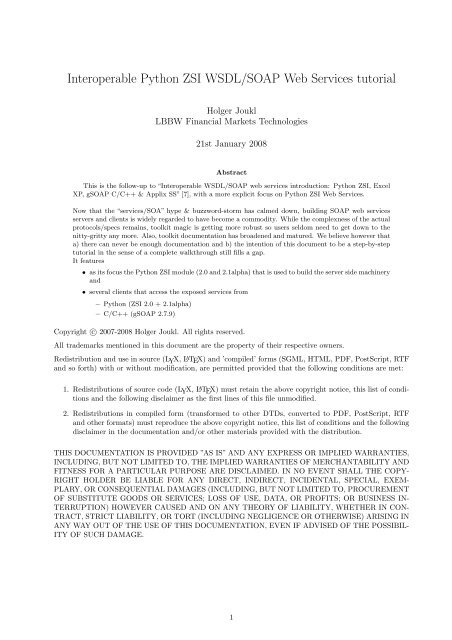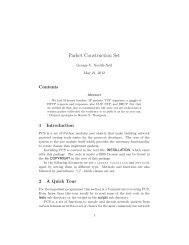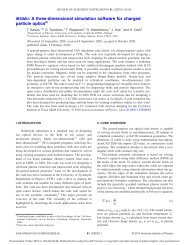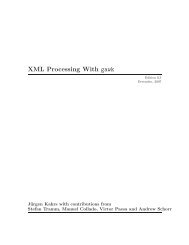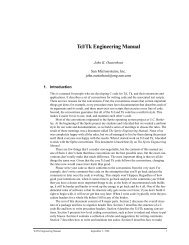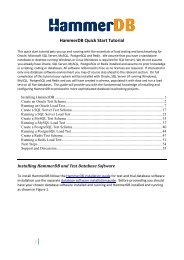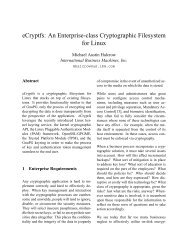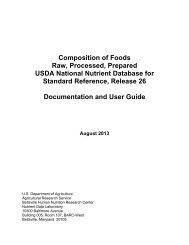Interoperable Python ZSI WSDL/SOAP Web Services tutorial
Interoperable Python ZSI WSDL/SOAP Web Services tutorial
Interoperable Python ZSI WSDL/SOAP Web Services tutorial
- No tags were found...
You also want an ePaper? Increase the reach of your titles
YUMPU automatically turns print PDFs into web optimized ePapers that Google loves.
<strong>Interoperable</strong> <strong>Python</strong> <strong>ZSI</strong> <strong>WSDL</strong>/<strong>SOAP</strong> <strong>Web</strong> <strong>Services</strong> <strong>tutorial</strong>Holger JouklLBBW Financial Markets Technologies21st January 2008AbstractThis is the follow-up to “<strong>Interoperable</strong> <strong>WSDL</strong>/<strong>SOAP</strong> web services introduction: <strong>Python</strong> <strong>ZSI</strong>, ExcelXP, g<strong>SOAP</strong> C/C++ & Applix SS” [7], with a more explicit focus on <strong>Python</strong> <strong>ZSI</strong> <strong>Web</strong> <strong>Services</strong>.Now that the “services/SOA” hype & buzzword-storm has calmed down, building <strong>SOAP</strong> web servicesservers and clients is widely regarded to have become a commodity. While the complexness of the actualprotocols/specs remains, toolkit magic is getting more robust so users seldom need to get down to thenitty-gritty any more. Also, toolkit documentation has broadened and matured. We believe however thata) there can never be enough documentation and b) the intention of this document to be a step-by-step<strong>tutorial</strong> in the sense of a complete walkthrough still fills a gap.It features• as its focus the <strong>Python</strong> <strong>ZSI</strong> module (2.0 and 2.1alpha) that is used to build the server side machineryand• several clients that access the exposed services from– <strong>Python</strong> (<strong>ZSI</strong> 2.0 + 2.1alpha)– C/C++ (g<strong>SOAP</strong> 2.7.9)Copyright c○ 2007-2008 Holger Joukl. All rights reserved.All trademarks mentioned in this document are the property of their respective owners.Redistribution and use in source (LYX, L A TEX) and ’compiled’ forms (SGML, HTML, PDF, PostScript, RTFand so forth) with or without modification, are permitted provided that the following conditions are met:1. Redistributions of source code (LYX, L A TEX) must retain the above copyright notice, this list of conditionsand the following disclaimer as the first lines of this file unmodified.2. Redistributions in compiled form (transformed to other DTDs, converted to PDF, PostScript, RTFand other formats) must reproduce the above copyright notice, this list of conditions and the followingdisclaimer in the documentation and/or other materials provided with the distribution.THIS DOCUMENTATION IS PROVIDED ”AS IS” AND ANY EXPRESS OR IMPLIED WARRANTIES,INCLUDING, BUT NOT LIMITED TO, THE IMPLIED WARRANTIES OF MERCHANTABILITY ANDFITNESS FOR A PARTICULAR PURPOSE ARE DISCLAIMED. IN NO EVENT SHALL THE COPY-RIGHT HOLDER BE LIABLE FOR ANY DIRECT, INDIRECT, INCIDENTAL, SPECIAL, EXEM-PLARY, OR CONSEQUENTIAL DAMAGES (INCLUDING, BUT NOT LIMITED TO, PROCUREMENTOF SUBSTITUTE GOODS OR SERVICES; LOSS OF USE, DATA, OR PROFITS; OR BUSINESS IN-TERRUPTION) HOWEVER CAUSED AND ON ANY THEORY OF LIABILITY, WHETHER IN CON-TRACT, STRICT LIABILITY, OR TORT (INCLUDING NEGLIGENCE OR OTHERWISE) ARISING INANY WAY OUT OF THE USE OF THIS DOCUMENTATION, EVEN IF ADVISED OF THE POSSIBIL-ITY OF SUCH DAMAGE.1
Contents1 Introduction 31.1 Goals & Concepts . . . . . . . . . . . . . . . . . . . . . . . . . . . . . . . . . . . . . . . . . . 31.2 Prerequisites . . . . . . . . . . . . . . . . . . . . . . . . . . . . . . . . . . . . . . . . . . . . . 41.3 A glance at the toolkits . . . . . . . . . . . . . . . . . . . . . . . . . . . . . . . . . . . . . . . 41.3.1 <strong>ZSI</strong> . . . . . . . . . . . . . . . . . . . . . . . . . . . . . . . . . . . . . . . . . . . . . . . 41.3.2 g<strong>SOAP</strong> . . . . . . . . . . . . . . . . . . . . . . . . . . . . . . . . . . . . . . . . . . . . 42 Simple datatypes: The rpc/literal SquareService 42.1 The SquareService <strong>WSDL</strong> . . . . . . . . . . . . . . . . . . . . . . . . . . . . . . . . . . . . . . 42.2 A <strong>Python</strong> <strong>ZSI</strong> server for the SquareService . . . . . . . . . . . . . . . . . . . . . . . . . . . . . 62.2.1 Generating stubs from <strong>WSDL</strong> . . . . . . . . . . . . . . . . . . . . . . . . . . . . . . . . 62.2.2 Writing the SquareService web server . . . . . . . . . . . . . . . . . . . . . . . . . . . 62.3 A <strong>Python</strong> <strong>ZSI</strong> client for the SquareService . . . . . . . . . . . . . . . . . . . . . . . . . . . . . 92.3.1 Using generated client code . . . . . . . . . . . . . . . . . . . . . . . . . . . . . . . . . 92.3.2 Using ServiceProxy . . . . . . . . . . . . . . . . . . . . . . . . . . . . . . . . . . . . . . 112.4 A g<strong>SOAP</strong> C++ client for the SquareService . . . . . . . . . . . . . . . . . . . . . . . . . . . . 132.4.1 Generation from <strong>WSDL</strong> . . . . . . . . . . . . . . . . . . . . . . . . . . . . . . . . . . . 132.4.2 Client implementation . . . . . . . . . . . . . . . . . . . . . . . . . . . . . . . . . . . . 142.4.3 g<strong>SOAP</strong> client compilation . . . . . . . . . . . . . . . . . . . . . . . . . . . . . . . . . 153 Structured datatypes: The rpc/literal DateService 163.1 The DateService <strong>WSDL</strong> . . . . . . . . . . . . . . . . . . . . . . . . . . . . . . . . . . . . . . . 163.2 A <strong>Python</strong> <strong>ZSI</strong> DateService server . . . . . . . . . . . . . . . . . . . . . . . . . . . . . . . . . . 173.2.1 Code generation from <strong>WSDL</strong> . . . . . . . . . . . . . . . . . . . . . . . . . . . . . . . . 173.2.2 The DateService server-side implementation . . . . . . . . . . . . . . . . . . . . . . . . 183.3 A <strong>Python</strong> <strong>ZSI</strong> client for the DateService . . . . . . . . . . . . . . . . . . . . . . . . . . . . . . 233.3.1 Using generated type mapping . . . . . . . . . . . . . . . . . . . . . . . . . . . . . . . 233.3.2 Using a ServiceProxy client . . . . . . . . . . . . . . . . . . . . . . . . . . . . . . . . . 273.4 A g<strong>SOAP</strong> C++ client for the DateService . . . . . . . . . . . . . . . . . . . . . . . . . . . . . 313.4.1 Code generation from <strong>WSDL</strong> . . . . . . . . . . . . . . . . . . . . . . . . . . . . . . . . 313.4.2 Client implementation . . . . . . . . . . . . . . . . . . . . . . . . . . . . . . . . . . . . 323.4.3 g<strong>SOAP</strong> Client compilation . . . . . . . . . . . . . . . . . . . . . . . . . . . . . . . . . 334 A document/literal service: The FinancialService 344.1 The FinancialService <strong>WSDL</strong> . . . . . . . . . . . . . . . . . . . . . . . . . . . . . . . . . . . . . 344.2 A <strong>Python</strong> <strong>ZSI</strong> FinancialService server . . . . . . . . . . . . . . . . . . . . . . . . . . . . . . . 364.2.1 Code generation from <strong>WSDL</strong> . . . . . . . . . . . . . . . . . . . . . . . . . . . . . . . . 364.2.2 The FinancialService server implementation . . . . . . . . . . . . . . . . . . . . . . . . 364.3 A <strong>Python</strong> <strong>ZSI</strong> client for the FinancialService . . . . . . . . . . . . . . . . . . . . . . . . . . . 384.4 A g<strong>SOAP</strong> C++ client for the FinancialService . . . . . . . . . . . . . . . . . . . . . . . . . . 404.4.1 Code generation from <strong>WSDL</strong> . . . . . . . . . . . . . . . . . . . . . . . . . . . . . . . . 404.4.2 Client implementation . . . . . . . . . . . . . . . . . . . . . . . . . . . . . . . . . . . . 414.4.3 g<strong>SOAP</strong> Client compilation . . . . . . . . . . . . . . . . . . . . . . . . . . . . . . . . . . 422
5 Afterthoughts 43A VistaSource Applixware spreadsheets as DateService clients 44A.0.1 Code generation from <strong>WSDL</strong> . . . . . . . . . . . . . . . . . . . . . . . . . . . . . . . . 44A.0.2 Applix client implementation . . . . . . . . . . . . . . . . . . . . . . . . . . . . . . . . 44B <strong>ZSI</strong> tracing hacks 54B.1 Detailed method call tracing . . . . . . . . . . . . . . . . . . . . . . . . . . . . . . . . . . . . . 54B.2 Logging the client request . . . . . . . . . . . . . . . . . . . . . . . . . . . . . . . . . . . . . . 601 IntroductionThis is the follow-up to article [7], mainly prompted by the need to get up-to-date with newer toolkit versions,especially the many changes and improvements in <strong>ZSI</strong>. While not explicitly stated, <strong>ZSI</strong> has been the strongfocus of this installment from the very beginning, easily noticeable by the fact that all the server code hasbeen <strong>Python</strong> <strong>ZSI</strong>-based. Therefore, this document focuses on <strong>ZSI</strong> and reduces the number of discussed <strong>Web</strong>Service client implementations in comparison to [7].The toolkit versions discussed here are:• <strong>ZSI</strong> 2.0 + 2.1alpha1 (<strong>Python</strong> 2.4.4)• g<strong>SOAP</strong> 2.7.9 (gcc 2.95.2, gcc 3.4.4)These are being put to use for several example <strong>Web</strong> <strong>Services</strong>.For legacy reference, the steps to instrument VistaSource Applixware 4.43 with <strong>Web</strong> <strong>Services</strong> capabilities(which is probably of minor interest to the average <strong>ZSI</strong>/g<strong>SOAP</strong> user) have been updated for the few g<strong>SOAP</strong>handling changes and still remain available in appendix A.Appendix B features a (arguably nifty) way to make <strong>ZSI</strong> tracing more verbose.1.1 Goals & ConceptsThis is a practice-report-gone-<strong>tutorial</strong>. The content and code examples presented here have been developedwith the primary goal to “make (fairly) simple examples work (at all)”, in a learning-by-doing manner. Thusthere is lots of room for enhancements, e.g. getting rid of hardcoded path names etc.All code examples are complete, executable and delivered with all the necessary command-line options tocreate and/or compile and/or run them.Conceptually, we use a <strong>WSDL</strong>-centric approach, sometimes referred to as top-down development: Thestarting point for all example service and client implementations will be the <strong>WSDL</strong> description. Note thatthis might differ from certain toolkits that start out with the service implementation in the host languageand generate the <strong>WSDL</strong> for you to expose the implemented service. We regard the latter to have a tendencyto not promote interoperability and to tie in implementation language details, which is certainly not whatwe want. 1Striving for interoperability, only the WS-I-compliant 2 rpc/literal and document/literal <strong>WSDL</strong> styles arepresented here.Throughout this document, certain host names or ports (“8080”) might used in the examples - you will haveto substitute those with the appropriate setup for your site, of course. Naturally, this can affect URLs definedin the example <strong>WSDL</strong>s and used to retrieve these <strong>WSDL</strong>s.Whenever you see sample client or server output throughout this document this is real output copied fromlive components but might have been reformatted to fit into the document somewhat nicer.1 In the first place, this came up partly due to the fact that the chosen server implementation (<strong>Python</strong> <strong>ZSI</strong>) offered nosuch tool and partly as a gut feeling. Since then, this opinion has grown stronger and has also been backed up by severalpractitioners´ readings at a conference (Stuttgarter Softwaretechnik Forum 2005, Stuttgart-Vaihingen, Germany) as well asexperience.2 The <strong>Web</strong> <strong>Services</strong>-Interoperability Organization (www.ws-i.org) provides so-called “profile” guidelines on using <strong>Web</strong> <strong>Services</strong>specifications in an interoperable manner.3
the square method Returnsx^2 (x**2, square(x)) for a given float xComments:• The style “rpc” and the use “literal” are used, to be WS-I-compliant. WS-I only supports rpc/literaland document/literal.• A custom port 8080 is used instead of the usual HTTP port 80.• The server name is a “symbolic” name, not a real known name in our site. This can cause the need togive explicit URLs from time to time.5
2.2 A <strong>Python</strong> <strong>ZSI</strong> server for the SquareService2.2.1 Generating stubs from <strong>WSDL</strong><strong>ZSI</strong> 2.1<strong>ZSI</strong> 2.1 comes with a python script wsdl2py to generate code from a <strong>WSDL</strong> file. It creates• python bindings for the service and data structures and• a server skeleton for service dispatch where the actual service worker code will be hooked into.If you have installed <strong>ZSI</strong> on top of your python installation you can invoke the scripts like this (change yourinstallation base path according to your setup): 6/apps/pydev/hjoukl/bin/wsdl2py SquareService.wsdlThis will generate the files• SquareService_client.py,• SquareService_server.py and• SquareService_types.py.<strong>ZSI</strong> 2.0 <strong>ZSI</strong> 2.0 uses the two scripts wsdl2py and wsdl2dispatch for code generation and uses differentnames for the generated files:$ /apps/pydev/bin/wsdl2py --file SquareService.wsdl$ /apps/pydev/bin/wsdl2dispatch --file SquareService.wsdl$ $ lsSquareService.wsdl@ SquareService_services_server.pySquareService_services.py SquareService_services_types.pyWhat do we have now? We have bindings to work with the services in python and a skeleton for dispatchingto the actual worker methods. What we still need is• the main program that runs a (HTTP-) server with a request handler for the services and• the hooks to invoke the worker methods.Luckily, <strong>ZSI</strong> includes the <strong>ZSI</strong>.ServiceContainer module which implements all this machinery for us.2.2.2 Writing the SquareService web serverThis is our main program mySquareServer.py. It basically imports the necessary <strong>ZSI</strong> stuff, adds minimalcommand line configurability for logging purposes and lets us choose a server HTTP port:<strong>ZSI</strong> 2.1#!/apps/pydev/hjoukl/bin/python2.4# *** <strong>ZSI</strong> 2.1 ***from optparse import OptionParser# Import the <strong>ZSI</strong> stuff you’d need no matter whatfrom <strong>ZSI</strong>.wstools import logging6 The installation base path for all <strong>ZSI</strong> 2.1 examples here is /apps/pydev/hjoukl.6
from <strong>ZSI</strong>.ServiceContainer import AsServer# Import the generated Server Objectfrom SquareService_server import SquareService<strong>ZSI</strong> 2.0# Create a Server implementation by inheritanceclass MySquareService(SquareService):# Make <strong>WSDL</strong> available for HTTP GET_wsdl = "".join(open("SquareService.wsdl").readlines())def soap_getSquare(self, ps, **kw):# Call the generated base class method to get appropriate# input/output data structuresrequest, response = SquareService.soap_getSquare(self, ps, **kw)response._return = self.getSquare(request._x)return request, responsedef getSquare(self, x):return x**2op = OptionParser(usage="%prog [options]")op.add_option("-l", "--loglevel", help="loglevel (DEBUG, WARN)",metavar="LOGLEVEL")op.add_option("-p", "--port", help="HTTP port",metavar="PORT", default=8080, type="int")options, args = op.parse_args()# set the loglevel according to cmd line argif options.loglevel:loglevel = eval(options.loglevel, logging.__dict__)logger = logging.getLogger("")logger.setLevel(loglevel)# Run the server with a given list servicesAsServer(port=options.port, services=[MySquareService(),])#!/apps/pydev/bin/python2.4# *** <strong>ZSI</strong> 2.0 ***from optparse import OptionParser# Import the <strong>ZSI</strong> stuff you’d need no matter whatfrom <strong>ZSI</strong>.wstools import loggingfrom <strong>ZSI</strong>.ServiceContainer import AsServer# Import the generated Server Objectfrom SquareService_services_server import SquareService# Create a Server implementation by inheritanceclass MySquareService(SquareService):# Make <strong>WSDL</strong> available for HTTP GET_wsdl = "".join(open("SquareService.wsdl").readlines())def soap_getSquare(self, ps, **kw):# Call the generated base class method to get appropriate# input/output data structures7
esponse = SquareService.soap_getSquare(self, ps, **kw)request = self.requestresponse._return = self.getSquare(request._x)return responsedef getSquare(self, x):return x**2op = OptionParser(usage="%prog [options]")op.add_option("-l", "--loglevel", help="loglevel (DEBUG, WARN)",metavar="LOGLEVEL")op.add_option("-p", "--port", help="HTTP port",metavar="PORT", default=8080, type="int")options, args = op.parse_args()# set the loglevel according to cmd line argif options.loglevel:loglevel = eval(options.loglevel, logging.__dict__)logger = logging.getLogger("")logger.setLevel(loglevel)# Run the server with a given list servicesAsServer(port=options.port, services=[MySquareService(),])Apart from the command line parsing stuff which is only usability sugar, <strong>ZSI</strong> provides us with everythingwe need. All we have to do is1. Create a class MySquareService that inherits from the generated SquareService class, to hook in theworker code. This is done with the overridden soap_getSquare() method, which• calls its base class method to retrieve the (input and) output data structure (i.e.response) andrequest &• invokes the worker code that performs the actual calculation, and populates the response datastructure. Note that the names in these data structure differ from the names in the <strong>WSDL</strong> inthat they use leading underscores. This is done with good reason (e.g., you can not use thename “return” for the result message part as avalid <strong>Python</strong> attribute name) due to XML allowing a far wider range of element names than the<strong>Python</strong> language. You can find details on <strong>ZSI</strong> naming concepts (“aname”) in the <strong>ZSI</strong> User Guide[2].Here´s the only difference between the 2.0 & 2.1 implementations, as 2.1 slightly changes the soap methods signature and return value.We also add a wsdl attribute that contains the <strong>WSDL</strong>, to be served when some client issues a HTTPGET (on ?wsdl), which is actually common behaviour to get the service description(apart from UDDI). 7 <strong>ZSI</strong> 2.0 wouldn´t need this additional step as its code generation mechanisms putall the <strong>WSDL</strong> source into the generated files anyway, but 2.1 does not (and we consider 2.1 behaviourcleaner).2. Put an instance of our class into the services argument of the AsServer() function.That´s it. We can now run a full-fledged WS-Server that hosts our SquareService.Comments:• The dispatch to the appropriate service operation is handled in the soapAction dictionary in thegenerated code. This dictionary maps the action that is requested to the method that gets invoked.The <strong>ZSI</strong> standard request handler takes the HTTP header field soapAction and propagates its value tothis dispatch mechanism. Thus, everything works out-of-the-box if you use the “soapAction” operationattributein your <strong>WSDL</strong> file (and if your service client actually provides this header field with itsrequest). We´ll see another way to drive the <strong>ZSI</strong> request handler in section 4.2.7 The service invocation itself uses HTTP POST. You might want to take a look at the <strong>ZSI</strong> ServiceContainer module and its<strong>SOAP</strong>RequestHandler class for more inside information.8
• Command-line options allow us to make use of <strong>ZSI</strong>´s logging capabilities, to print out more informationon <strong>ZSI</strong> server workings (unfortunately, not the incoming XML request. See section B.2 for help onthis).2.3 A <strong>Python</strong> <strong>ZSI</strong> client for the SquareService2.3.1 Using generated client codeWe implement a client that calls getSquare from the SquareService in mySquareClient.py as follows:<strong>ZSI</strong> 2.1#!/apps/pydev/hjoukl/bin/python2.4# *** <strong>ZSI</strong> 2.1 ***import sysfrom optparse import OptionParser# Import the generated client codefrom SquareService_client import *op = OptionParser(usage="%prog [options]")op.add_option("-u", "--url", help="service URL", metavar="URL")options, args = op.parse_args()service = SquareServiceLocator().getSquarePort(url=options.url, tracefile=sys.stdout)print ’\nAccessing service SquareService, method getSquare...’while 1:x = float(raw_input("Enter x: "))request = getSquareRequest(x=x)response = service.getSquare(request)print "x**2 =", response._return<strong>ZSI</strong> 2.0#!/apps/pydev/bin/python2.4# *** <strong>ZSI</strong> 2.0 ***import sysfrom optparse import OptionParser# Import the generated client codefrom SquareService_services import *op = OptionParser(usage="%prog [options]")op.add_option("-u", "--url", help="service URL", metavar="URL")options, args = op.parse_args()service = SquareServiceLocator().getSquarePortType(url=options.url, tracefile=sys.stdout)9
print ’\nAccessing service SquareService, method getSquare...’while 1:x = float(raw_input("Enter x: "))request = getSquareRequest()request._x = xresponse = service.getSquare(request)print "x**2 =", response._returnThis is pretty straightforward. Some of the code handles command line stuff which has nothing to do withweb services in the first place. The things we have to do is to1. Import the generated code we need, from either the SquareService_client (<strong>ZSI</strong> 2.1) / SquareService_services(<strong>ZSI</strong> 2.0) module,2. Create a SquareServiceLocator,3. Invoke its getSquarePort() (<strong>ZSI</strong> 2.1) / getSquarePortType() (<strong>ZSI</strong> 2.0)method to retrive the squareservice binding,4. populate the request data structure• using keyword-arguments (<strong>ZSI</strong> 2.1)• by explicitly setting request instance attributes (<strong>ZSI</strong> 2.0)5. call the service binding´s getSquare() method with the request data as input parameter and6. read the result data structure.Again, the naming concepts of <strong>ZSI</strong> as noted in section 2.2.2 apply.This is a sample session of our new client:$ ./mySquareClient.py -u "http://adevp02:8080/SquareService"Accessing service SquareService, method getSquare...Enter x: 3_________________________________ Wed Jan 2 10:16:23 2008 REQUEST:3.000000_________________________________ Wed Jan 2 10:16:23 2008 RESPONSE:200OK-------Server: <strong>ZSI</strong>/1.1 BaseHTTP/0.3 <strong>Python</strong>/2.4.4Date: Wed, 02 Jan 2008 09:16:23 GMTContent-type: text/xml; charset="utf-8"Content-Length: 49710
9.000000x**2 = 9.0Enter x:Comments:• We use an explicit URL to access the service, as our <strong>WSDL</strong> contains only the “symbolic” server namenot known by our site´s naming services. In a real-world application, you’d not even need to do so, asthe generated client code knows the service URL as given in the <strong>WSDL</strong>.• The client does not issue any HTTP GET for service access, because all the necessary data structureshave been pre-generated from the <strong>WSDL</strong> service description.2.3.2 Using ServiceProxy<strong>ZSI</strong> also offers an option to implement a client without using the pre-generated stub code: Everything canbe accessed through the ServiceProxy object that gets all the necessary information from the <strong>WSDL</strong>, onthe fly. This is an example of a ServiceProxy-client (the very same code works with both <strong>ZSI</strong> 2.1 & 2.0):#!/apps/pydev/bin/python2.4import sysfrom optparse import OptionParserfrom <strong>ZSI</strong>.ServiceProxy import ServiceProxyop = OptionParser(usage="%prog [options]")op.add_option("-u", "--url", help="service URL (mandatory)", metavar="URL")options, args = op.parse_args()if not options.url:op.print_help()sys.exit(1)else:# "Canonicalize" <strong>WSDL</strong> URLoptions.url = options.url.replace("?<strong>WSDL</strong>", "?wsdl")if not options.url.endswith("?wsdl"):options.url += "?wsdl"service = ServiceProxy(wsdl=options.url, tracefile=sys.stdout)print ’\nAccessing service SquareService, method getSquare...’while 1:x = float(raw_input("Enter x: "))resultDict = service.getSquare(x=x)print "x**2 =", resultDict[’return’]11
Basically, all you need to do is to create a ServiceProxy instance with the information where to get the<strong>WSDL</strong>. You can then simply access its getSquare method; only make sure you give its argument as a keywordargument.This is the output of an example ServiceProxy-client run:$ ./mySquareSPclient.py -u "http://adevp02:8080/SquareService?wsdl"Accessing service SquareService, method getSquare...Enter x: 4_________________________________ Wed Jan 2 10:30:17 2008 REQUEST:4.000000_________________________________ Wed Jan 2 10:30:18 2008 RESPONSE:200OK-------Server: <strong>ZSI</strong>/1.1 BaseHTTP/0.3 <strong>Python</strong>/2.4.4Date: Wed, 02 Jan 2008 09:30:17 GMTContent-type: text/xml; charset="utf-8"Content-Length: 49816.000000x**2 = 16.0Enter x:Comments:• When running the ServiceProxy-notion of a <strong>ZSI</strong> WS-client, take a good look at your <strong>ZSI</strong> server. Youwill then see that the ServiceProxy client issues an HTTP GET first, to retrieve the <strong>WSDL</strong> informationand create the necessary code and data structures.• To tell the whole truth, ServiceProxy basically does much the same code generation like wsdl2py underthe hood, and creates a cache dir ~/.zsi_service_proxy_dir (<strong>ZSI</strong> 2.1) resp. ./.service_proxy_dir(<strong>ZSI</strong> 2.0) for the generated files. This cache dir is then appended to sys.path for module import. 88 The attentive reader might observe that this may have an implication on ServiceProxy-client behaviour depending on whereyou run it. As the local directory is the 1st sys.path entry per default, existing pre-generated (from wsdl2py) code might beatthe cache-dir modules in import order - depending on module naming.12
2.4 A g<strong>SOAP</strong> C++ client for the SquareService2.4.1 Generation from <strong>WSDL</strong>With our SquareService server running, we can generate the client stubs:1. First, g<strong>SOAP</strong> needs to create a header file for the service using the wsdl2h generator:/apps/pydev/bin/wsdl2h -o squareService.hhttp://adevp02:8080/SquareService?wsdlJust specify the name for the header file and the URL where the <strong>WSDL</strong> can be received with a HTTPGET request. The squareService.h header will be created:/apps/pydev/bin/wsdl2h -o squareService.h http://adevp02:8080/SquareService?wsdl** The g<strong>SOAP</strong> <strong>WSDL</strong> parser for C and C++ 1.2.9l** Copyright (C) 2000-2007 Robert van Engelen, Genivia Inc.** All Rights Reserved. This product is provided "as is", without any warranty.** The g<strong>SOAP</strong> <strong>WSDL</strong> parser is released under one of the following two licenses:** GPL or the commercial license by Genivia Inc. Use option -l for more info.Saving squareService.hCannot open file ’typemap.dat’Problem reading type map file typemap.dat.Using internal type definitions for C++ instead.Connecting to ’http://adevp02:8080/SquareService?wsdl’ to retrieve<strong>WSDL</strong>/XSD... connected, receiving...Warning: part ’return’ uses literal style and should refer to an elementrather than a typeWarning: part ’x’ uses literal style and should refer to an elementrather than a typeWarning: part ’x’ uses literal style and should refer to an elementrather than a typeWarning: part ’x’ uses literal style and should refer to an elementrather than a typeTo complete the process, compile with:soapcpp2 squareService.hNote that g<strong>SOAP</strong> tells us about what it thinks might cause problems in our <strong>WSDL</strong>; we ignore that forthis example.2. Next we let g<strong>SOAP</strong> create the stub code for us, using the newly-created header:$ /apps/pydev/bin/soapcpp2 -I /data/pydev/DOWNLOADS/<strong>Web</strong><strong>Services</strong>/C++/gsoap-2.7/soapcpp2/import squareService.h** The g<strong>SOAP</strong> Stub and Skeleton Compiler for C and C++ 2.7.9l** Copyright (C) 2000-2007, Robert van Engelen, Genivia Inc.** All Rights Reserved. This product is provided "as is", without any warranty.** The g<strong>SOAP</strong> compiler is released under one of the following three licenses:** GPL, the g<strong>SOAP</strong> public license, or the commercial license by Genivia Inc.13
Saving soapStub.hSaving soapH.hSaving soapC.cppSaving soapClient.cppSaving soapClientLib.cppSaving soapServer.cppSaving soapServerLib.cppUsing ns1 service name: SquareBindingUsing ns1 service style: documentUsing ns1 service encoding: literalUsing ns1 service location: http://adevp02:8080/SquareServiceUsing ns1 schema namespace: http://services.zsiserver.net/SquareServiceSaving soapSquareBindingProxy.h client proxySaving soapSquareBindingObject.h server objectSaving SquareBinding.getSquare.req.xml sample <strong>SOAP</strong>/XML requestSaving SquareBinding.getSquare.res.xml sample <strong>SOAP</strong>/XML responseSaving SquareBinding.nsmap namespace mapping tableCompilation successfulWe must explicitly give the g<strong>SOAP</strong>/soapcpp2 directory as include directory. This is not being installedwith the g<strong>SOAP</strong> installation (in the “make install” step) but resides in the path where you extractedthe g<strong>SOAP</strong> tarball. It contains some special header files g<strong>SOAP</strong> does not install on your system.You might have noticed that soapcpp2 says it is using service style “document” as opposed to what´sdefined in the <strong>WSDL</strong> (“rpc”); this seems to be a cosmetic issue only and does not affect the usabilityof the generated code.The above command produces the following client stubs (server skeleton code also by the way, but wewill not use it here):$ ls -ltotal 105-rw-r--r--1 lb54320 intern 444 Jan 2 10:48 SquareBinding.getSquare.req.xml-rw-r--r--1 lb54320 intern 470 Jan 2 10:48 SquareBinding.getSquare.res.xml-rw-r--r-- 1 lb54320 intern 556 Jan 2 10:48 SquareBinding.nsmap-rw-r--r-- 1 lb54320 intern 57364 Jan 2 10:48 soapC.cpp-rw-r--r-- 1 lb54320 intern 2326 Jan 2 10:48 soapClient.cpp-rw-r--r-- 1 lb54320 intern 464 Jan 2 10:48 soapClientLib.cpp-rw-r--r-- 1 lb54320 intern 15694 Jan 2 10:48 soapH.h-rw-r--r-- 1 lb54320 intern 3152 Jan 2 10:48 soapServer.cpp-rw-r--r-- 1 lb54320 intern 464 Jan 2 10:48 soapServerLib.cpp-rw-r--r-- 1 lb54320 intern 2470 Jan 2 10:48 soapSquareBindingObject.h-rw-r--r-- 1 lb54320 intern 1826 Jan 2 10:48 soapSquareBindingProxy.h-rw-r--r-- 1 lb54320 intern 6915 Jan 2 10:48 soapStub.h-rw-r--r-- 1 lb54320 intern 6662 Jan 2 10:38 squareService.hWhat´s left now is to implement the client program and make use of the generated code.2.4.2 Client implementationThis is a sample client to access the SquareService:$ cat myCSquareClient.cpp#include "soapH.h"#include "SquareBinding.nsmap"#include 14
int main(void){struct soap soap;double x = 0;struct ns1__getSquareResponse response;soap_init(&soap);while (1) {std::cout < < "Enter x value: ";std::cin > > x;if (soap_call_ns1__getSquare(&soap, NULL, NULL, x, response)== <strong>SOAP</strong>_OK) {std::cout < < "Result: " < < response.return_ < < std::endl;} else {soap_print_fault(&soap, stderr);}}soap_destroy(&soap);soap_end(&soap);soap_done(&soap);return 0;}Comments:• Note g<strong>SOAP</strong>´s renaming of the <strong>WSDL</strong> result message part to return_ in the response data structure struct ns1__getSquareResponse to cater for conflicts withreserved C/C++ words, similar to the <strong>ZSI</strong> “aname” concept• There are also other ways to invoke this service with the g<strong>SOAP</strong> mechanisms, namely the Square-Binding class defined in soapSquareBindingProxy.h, which would take care of the initialization &destruction activities needed in the above client code. We will use this (better) approach in the nextexamples.2.4.3 g<strong>SOAP</strong> client compilationgcc 2.95.2$ g++ -o myCSquareClient -R/apps/prod/lib -I/apps/pydev/include-L/apps/pydev/lib soapC.cpp soapClient.cpp myCSquareClient.cpp -lgsoap++ -lsocketgcc 3.4.4Note: Compiling with gcc 3.4.4, the nsl library had to be added to the linked libraries:/apps/local/gcc/3.4.4/bin/g++ -o myCSquareClient -R /apps/prod/gcc/3.4.4/lib -I/apps/pydev/gcc/3.4.4/include -L/apps/pydev/gcc/3.4.4/lib soapC.cpp soapClient.cpp myCSquareClient.cpp -lgsoap++ -lsocket -lnslYou can then run this simple C++ <strong>Web</strong> Service client:$ ./myCSquareClientEnter x value: 3Result: 9Enter x value: ^C15
3 Structured datatypes: The rpc/literal DateServiceLet´s move on to a more elaborate service, elaborate in the sense of using structured datatypes now (notthat the service example itself was particularly ingenious). Anyway, we will now implement the Date<strong>Services</strong>ervice that exposes two methods:• getCurrentDate() takes a string argument and returns the current date asa datetime structure• getDate(, ) takes an integer offset and a date structure asarguments and returns the given date plus the offset (in days) as a date structure3.1 The DateService <strong>WSDL</strong>The DateService is described in DateService.wsdl:16
Date <strong>Web</strong> ServiceComments:• Again, rpc/literal has been chosen.• A ComplexType “Date” is defined in the section. This type is being used as a return type(getCurrentDate, getDate) and as a method argument type (getDate).3.2 A <strong>Python</strong> <strong>ZSI</strong> DateService serverThe tasks at hand are the same as for the SquareService example.3.2.1 Code generation from <strong>WSDL</strong><strong>ZSI</strong> 2.117
$ /apps/pydev/hjoukl/bin/wsdl2py DateService.wsdl$ ls -ltotal 15-rw-r--r-- 1 lb54320 intern 3180 Jan 2 14:12 DateService.wsdl-rw-r--r-- 1 lb54320 intern 3935 Jan 2 14:12 DateService_client.py-rw-r--r-- 1 lb54320 intern 3209 Jan 2 14:12 DateService_server.py-rw-r--r-- 1 lb54320 intern 2896 Jan 2 14:12 DateService_types.py<strong>ZSI</strong> 2.0$ /apps/pydev/bin/wsdl2py -f DateService.wsdl$ /apps/pydev/bin/wsdl2dispatch -f DateService.wsdl$ ls -ltotal 34lrwxrwxrwx 1 lb54320 intern 28 Jan 3 17:45 DateService.wsdl -> ../2.1alpha/DateService.wsdl-rw-r--r-- 1 lb54320 intern 3525 Jan 7 09:56 DateService_services.py-rw-r--r-- 1 lb54320 intern 4428 Jan 7 09:56 DateService_services_server.py-rw-r--r-- 1 lb54320 intern 2818 Jan 7 09:56 DateService_services_types.py3.2.2 The DateService server-side implementationThe server implementation needs exactly the same steps as seen in section 2.2.2, with the difference of puttinga DateService instance into the ServiceContainer now. We create a server myDateServer.py like this:<strong>ZSI</strong> 2.1#!/apps/pydev/hjoukl/bin/python2.4import timefrom optparse import OptionParser# Import the <strong>ZSI</strong> stuff you’d need no matter whatfrom <strong>ZSI</strong>.wstools import loggingfrom <strong>ZSI</strong>.ServiceContainer import AsServer# Import the generated Server Objectfrom DateService_server import *# Create a Server implementation by inheritanceclass MyDateService(simple_Date_Service):# Make <strong>WSDL</strong> available for HTTP GET_wsdl = "".join(open("DateService.wsdl").readlines())def soap_getCurrentDate(self, ps, **kw):# Call the generated base class method to get appropriate# input/output data structuresrequest, response = simple_Date_Service.soap_getCurrentDate(self,ps, **kw)print "Client says:", request._inputdt = time.localtime(time.time())# Use a structurally equivalent (to the <strong>WSDL</strong> complex type structure)# python class objectclass today:_year = dt[0]_month = dt[1]_day = dt[2]_hour = dt[3]_minute = dt[4]_second = dt[5]_weekday = dt[6]_dayOfYear = dt[7]_dst = dt[8]response._today = today18
eturn request, responsedef soap_getDate(self, ps, **kw):# Call the generated base class method to get appropriate# input/output data structuresrequest, response = simple_Date_Service.soap_getDate(self, ps, **kw)date = request._somedayoffset = request._offsetif not offset:offset = 0if not date:raise RuntimeError("missing input data")# actual worker code, add give offset to given input datesec = 3600 * 24 # seconds/hour * 24hprovidedDate_tuple = (date._year, date._month, date._day,date._hour, date._minute, date._second,date._weekday, date._dayOfYear, date._dst)providedDate_sec = time.mktime(providedDate_tuple)offset_sec = sec * offsetnewDate_sec = providedDate_sec + offset_secnewDate_tuple = time.localtime(newDate_sec)response = getDateResponse()# Use a structurally equivalent (to the <strong>WSDL</strong> complex type structure)# python class objectclass day:_year = newDate_tuple[0]_month = newDate_tuple[1]_day = newDate_tuple[2]_hour = newDate_tuple[3]_minute = newDate_tuple[4]_second = newDate_tuple[5]_weekday = newDate_tuple[6]_dayOfYear = newDate_tuple[7]_dst = newDate_tuple[8]response._day = dayreturn request, responseop = OptionParser(usage="%prog [options]")op.add_option("-l", "--loglevel", help="loglevel (DEBUG, WARN)",metavar="LOGLEVEL")op.add_option("-p", "--port", help="HTTP port",metavar="PORT", default=8080, type="int")options, args = op.parse_args()# set the loglevel according to cmd line argif options.loglevel:loglevel = eval(options.loglevel, logging.__dict__)logger = logging.getLogger("")logger.setLevel(loglevel)# Run the server with a given list servicesAsServer(port=options.port, services=[MyDateService(),])As in the previous example, the actual implementation has been hooked into the server skeleton, by inheritingfrom the generated service class.If you take a closer look at the two method implementations, you will notice that the data structures usedfor the returned date are just (nested) python classes. <strong>ZSI</strong> handles the serialization of that class into the19
actual <strong>SOAP</strong> message for us. 9 InComments:• This time, we did not strictly separate the worker code from the soap_ methods.• The handling of complex types can be made more convenient by using the –complexType option ofwsdl2py. This is the recommended way to go and we´ll see how it works in section 4, but it requiresmetaclass magic and thus new-style classes to work, so you will require <strong>Python</strong> >= 2.2.<strong>ZSI</strong> 2.0 Remembering the SquareService example, the <strong>ZSI</strong> 2.1 and 2.0 server code differed only in thereturn value and method signature of the soap_()-method implementation-wise. We can exploit thisto reuse the code written for <strong>ZSI</strong> 2.1, by help of an adapter module that provides some facilities to auto-wrapthese methods. Using this adapter module, we can now implement a working <strong>ZSI</strong> 2.0 server like this:import timefrom optparse import OptionParser# Import the <strong>ZSI</strong> stuff you’d need no matter whatfrom <strong>ZSI</strong>.wstools import loggingfrom <strong>ZSI</strong>.ServiceContainer import AsServer# Import the generated Server Objectfrom <strong>ZSI</strong>.version import Version as zsiversionprint "*** <strong>ZSI</strong> version %s ***" % (zsiversion,)# Import the generated Server Objecttry:# 2.1alphafrom DateService_server import simple_Date_Service# Dummy implementationdef adapt(method):return methodexcept ImportError, e:# 2.0finalfrom DateService_services_server import simple_Date_Servicefrom service_adaptor import ServiceAdaptor21adapt = ServiceAdaptor21.adapt# Wrap generated 2.0 class to 2.1 soap_ method behavioursimple_Date_Service = ServiceAdaptor21(simple_Date_Service)# Create a Server implementation by inheritance# 2.1alpha implementationclass MyDateService(simple_Date_Service):# Make <strong>WSDL</strong> available for HTTP GET_wsdl = "".join(open("DateService.wsdl").readlines())@adaptdef soap_getCurrentDate(self, ps, **kw):# Call the generated base class method to get appropriate# input/output data structuresrequest, response = simple_Date_Service.soap_getCurrentDate(self,ps, **kw)print "Client says:", request._inputdt = time.localtime(time.time())# Use a structurally equivalent (to the <strong>WSDL</strong> complex type structure)# python class objectclass today:_year = dt[0]9 The python object must be “structurally equivalent” to the XML datatype that is defined in the <strong>WSDL</strong> and that constitutes<strong>ZSI</strong>´s typecodes.20
_month = dt[1]_day = dt[2]_hour = dt[3]_minute = dt[4]_second = dt[5]_weekday = dt[6]_dayOfYear = dt[7]_dst = dt[8]response._today = todayreturn request, response@adaptdef soap_getDate(self, ps, **kw):# Call the generated base class method to get appropriate# input/output data structuresrequest, response = simple_Date_Service.soap_getDate(self, ps, **kw)date = request._somedayoffset = request._offsetif not offset:offset = 0if not date:raise RuntimeError("missing input data")# actual worker code, add give offset to given input datesec = 3600 * 24 # seconds/hour * 24hprovidedDate_tuple = (date._year, date._month, date._day,date._hour, date._minute, date._second,date._weekday, date._dayOfYear, date._dst)providedDate_sec = time.mktime(providedDate_tuple)offset_sec = sec * offsetnewDate_sec = providedDate_sec + offset_secnewDate_tuple = time.localtime(newDate_sec)# Use a structurally equivalent (to the <strong>WSDL</strong> complex type structure)# python class objectclass day:_year = newDate_tuple[0]_month = newDate_tuple[1]_day = newDate_tuple[2]_hour = newDate_tuple[3]_minute = newDate_tuple[4]_second = newDate_tuple[5]_weekday = newDate_tuple[6]_dayOfYear = newDate_tuple[7]_dst = newDate_tuple[8]response._day = dayreturn request, responseop = OptionParser(usage="%prog [options]")op.add_option("-l", "--loglevel", help="loglevel (DEBUG, WARN)",metavar="LOGLEVEL")op.add_option("-p", "--port", help="HTTP port",metavar="PORT", default=8080, type="int")options, args = op.parse_args()# set the loglevel according to cmd line argif options.loglevel:loglevel = eval(options.loglevel, logging.__dict__)logger = logging.getLogger("")logger.setLevel(loglevel)21
# Run the server with a given list servicesAsServer(port=options.port, services=[MyDateService(),])Now, this code will actually work with both <strong>ZSI</strong> 2.0 and 2.1, as it provides a <strong>ZSI</strong>-2.1-dummy for the @adaptdecoration.However, as we have seen in the SquareService example, it is very feasible to manually makethe changes needed for the different library versions, without depending on the “magic” service_adaptorprovides.Here´s the implementation of the service_adaptor module (you can skip this section if you’re running 2.1anyway or if you are not interested in the inner workings of this 10 ):$ cat service_adaptor.pyimport types# Based on "Method enhancement" <strong>Python</strong> cookbook recipee by Ken Seehof# (http://aspn.activestate.com/ASPN/Cookbook/<strong>Python</strong>/Recipe/81982)}class ServiceAdaptor21(object):"""Helper class factory to provide <strong>ZSI</strong> 2.1 code compatibility.Takes a <strong>ZSI</strong> 2.0 service class and returns a class derived from this serviceclass, that uses the <strong>ZSI</strong> 2.1 soap_method signature + return valueconventions.Can be used to make a <strong>ZSI</strong> 2.1-based service class implementation work withthe <strong>ZSI</strong> 2.0 library.Parameters:<strong>ZSI</strong>20ServiceClass: Service class, as imported from <strong>ZSI</strong> 2.0-generatedmodule code"""@staticmethoddef enhanced_method(method, replacement):"""Return a callable wrapped with a replacement callable"""def _f(*args, **kwargs):return replacement(method, *args, **kwargs)_f.__name__ = method.__name__return _f@staticmethoddef _adaptTo21_soap_(orig_method, self, ps, **kwargs):"""Wrapper method implementation, <strong>ZSI</strong> 2.0 soap_ method to <strong>ZSI</strong> 2.1 soap_method interface"""response = orig_method(self, ps)return self.request, response@staticmethoddef _adaptTo20_soap_(orig_method, self, ps, **kwargs):"""Wrapper method implementation, <strong>ZSI</strong> 2.1 soap_ method to <strong>ZSI</strong> 2.0 soap_method interface"""request, response = orig_method(self, ps)return response@staticmethoddef adapt(method):"""Method decorator to decorate <strong>ZSI</strong> 2.1-conforming soap_ method to <strong>ZSI</strong>2.0 method interface"""return ServiceAdaptor21.enhanced_method(method, ServiceAdaptor21._adaptTo20_soap_)10 You might want to look at the <strong>Python</strong> cookbook recipee ”Method enhancement” by Ken Seehof(http://aspn.activestate.com/ASPN/Cookbook/<strong>Python</strong>/Recipe/81982) for background22
def __new__(cls, <strong>ZSI</strong>20ServiceClass):derived_dict = {}for methodName in <strong>ZSI</strong>20ServiceClass.__dict__:if methodName.startswith("soap_"):method = <strong>ZSI</strong>20ServiceClass.__dict__[methodName]derived_dict[methodName] = cls.enhanced_method(method, cls._adaptTo21_soap_)return types.ClassType(<strong>ZSI</strong>20ServiceClass.__name__,bases=(<strong>ZSI</strong>20ServiceClass,), dict=derived_dict)3.3 A <strong>Python</strong> <strong>ZSI</strong> client for the DateService3.3.1 Using generated type mappingAs seen before, we use the <strong>ZSI</strong>-generated code to write a client that calls both service methods:<strong>ZSI</strong> 2.1#! /apps/pydev/hjoukl/bin/python2.4# *** <strong>ZSI</strong> 2.1 ***import sys, timefrom optparse import OptionParserfrom <strong>ZSI</strong>.version import Version as zsiversionprint "*** <strong>ZSI</strong> version %s ***" % (zsiversion,)from DateService_client import *def main():op = OptionParser(usage="%prog [options]")op.add_option("-u", "--url", help="service URL", metavar="URL")op.add_option("-i", "--input", type="string",help="input string for getCurrentDate WS method",metavar="INPUT")options, args = op.parse_args()loc = simple_Date_ServiceLocator()service = loc.getDateService_Port(url=options.url, tracefile=sys.stdout)while 1:offset = raw_input("Enter offset as int [0]: ")try:offset = int(offset)except ValueError:offset = 0currentRequest = getCurrentDateRequest()currentRequest._input = options.inputcurrentResponse = service.getCurrentDate(currentRequest)# We use the current date as input to getDatedateRequest = getDateRequest(offset=offset, someday=currentResponse._today)response = service.getDate(dateRequest)print ’\n\nRESULT’23
print ’%10s = %s’ % (’today’, make_asctime(currentResponse._today))print ’%6s + %d = %s’ % (’today’,dateRequest._offset, make_asctime(response._day))# just a helperdef make_asctime(date_object):timeTuple = (date_object._year, date_object._month, date_object._day,date_object._hour, date_object._minute, date_object._second,date_object._weekday, date_object._dayOfYear, date_object._dst)return time.asctime(timeTuple)if __name__ == ’__main__’:main()As can be seen, <strong>ZSI</strong> provides us with the getCurrentDateRequest and getDateRequest classes. Thesehandle the serialization transparently and we use them to set the argument values. Then, we hand them intothe corresponding methods of the service port object retrieved with the simple_Date_ServiceLocator-.getDateService_Port()method.Running this client gives the following output:$ ./myDateClient.py -u "http://adevp02:8080/DateService?wsdl" -i HALLO*** <strong>ZSI</strong> version (2, 1, 0) ***Enter offset as int [0]: 0_________________________________ Thu Jan 3 08:40:56 2008 REQUEST:HALLO_________________________________ Thu Jan 3 08:40:56 2008 RESPONSE:200OK-------Server: <strong>ZSI</strong>/1.1 BaseHTTP/0.3 <strong>Python</strong>/2.4.4Date: Thu, 03 Jan 2008 07:40:56 GMTContent-type: text/xml; charset="utf-8"Content-Length: 62720081324
84056330_________________________________ Thu Jan 3 08:40:56 2008 REQUEST:020081384056330_________________________________ Thu Jan 3 08:40:56 2008 RESPONSE:200OK-------Server: <strong>ZSI</strong>/1.1 BaseHTTP/0.3 <strong>Python</strong>/2.4.4Date: Thu, 03 Jan 2008 07:40:56 GMTContent-type: text/xml; charset="utf-8"Content-Length: 60920081384056330RESULTtoday = Thu Jan 3 08:40:56 2008today + 0 = Thu Jan 3 08:40:56 2008Enter offset as int [0]: ^CNote that we gave an explicit URL of “http://adevp02:8080/DateService?wsdl”. <strong>ZSI</strong> transparently uses therelevant part of this URL for service invocation, silently ignoring the “?wsdl” suffix.25
<strong>ZSI</strong> 2.0#! /apps/pydev/bin/python2.4# *** <strong>ZSI</strong> 2.0 ***import sys, timefrom copy import copyfrom optparse import OptionParserfrom <strong>ZSI</strong>.version import Version as zsiversionprint "*** <strong>ZSI</strong> version %s ***" % (zsiversion,)from DateService_services import *def main():op = OptionParser(usage="%prog [options]")op.add_option("-u", "--url", help="service URL", metavar="URL")op.add_option("-i", "--input", type="string",help="input string for getCurrentDate WS method",metavar="INPUT")options, args = op.parse_args()loc = simple_Date_ServiceLocator()service = loc.getDateService_PortType(url=options.url, tracefile=sys.stdout)while 1:offset = raw_input("Enter offset as int [0]: ")try:offset = int(offset)except ValueError:offset = 0currentRequest = getCurrentDateRequest()currentRequest._input = options.inputcurrentResponse = service.getCurrentDate(currentRequest)# We use the current date as input to getDatedateRequest = getDateRequest()dateRequest._offset = offset# Workaround for <strong>ZSI</strong> 2.0 bug #1755740:# Multiple calls to method _get_type_or_substitute erroneously changes# attributes of a substitute typecode without making a (shallow) copycurrentResponse._today.typecode = copy(currentResponse._today.typecode)dateRequest._someday = currentResponse._todayresponse = service.getDate(dateRequest)print ’\n\nRESULT’print ’%10s = %s’ % (’today’, make_asctime(currentResponse._today))print ’%6s + %d = %s’ % (’today’,dateRequest._offset, make_asctime(response._day))# just a helperdef make_asctime(date_object):timeTuple = (date_object._year, date_object._month, date_object._day,date_object._hour, date_object._minute, date_object._second,date_object._weekday, date_object._dayOfYear, date_object._dst)return time.asctime(timeTuple)26
if __name__ == ’__main__’:main()Again the <strong>ZSI</strong> 2.0 implementation differs only in details:• import the generated code from DateService_services (rather than DateService_client in <strong>ZSI</strong> 2.1)• retrieve the service binding through the simple_Date_ServiceLocator.getDateService_PortType()method (rather than simple_Date_ServiceLocator.getDateService_Port() in <strong>ZSI</strong> 2.1• instantiate the getDateRequest structure and then populate it (as opposed to using keyword args in<strong>ZSI</strong> 2.1)Unfortunately, <strong>ZSI</strong> 2.0 has a bug that bites us so we need to use a workaround here (see code comments).3.3.2 Using a ServiceProxy clientAlternatively, we can implement a client with the ServiceProxy class without using the generated code. Thisversion works for both <strong>ZSI</strong> 2.0 & 2.1:# *** <strong>ZSI</strong> 2.0 & 2.1 ***import sys, timefrom optparse import OptionParserfrom <strong>ZSI</strong>.version import Version as zsiversionprint "*** <strong>ZSI</strong> version %s ***" % (zsiversion,)from <strong>ZSI</strong>.ServiceProxy import ServiceProxyop = OptionParser(usage="%prog [options]")op.add_option("-u", "--url", help="service URL (mandatory)", metavar="URL")op.add_option("-i", "--input", type="string",help="input string for getCurrentDate WS method",metavar="INPUT")# just a helperdef make_asctime(date_dict):timeTuple = (date_dict["year"], date_dict["month"], date_dict["day"],date_dict["hour"], date_dict["minute"], date_dict["second"],date_dict["weekday"], date_dict["dayOfYear"],date_dict["dst"])return time.asctime(timeTuple)options, args = op.parse_args()if not options.url:op.print_help()sys.exit(1)else:# "Canonicalize" <strong>WSDL</strong> URLoptions.url = options.url.replace("?<strong>WSDL</strong>", "?wsdl")if not options.url.endswith("?wsdl"):options.url += "?wsdl"service = ServiceProxy(wsdl=options.url, tracefile=sys.stdout)print ’\nAccessing service DateService...’while 1:offset = raw_input("Enter offset as int [0]: ")try:offset = int(offset)except ValueError:offset = 0currentResponse = service.getCurrentDate(input=options.input)27
# We get back a dictionarayprint "currentResponse:", currentResponse# Manually fill the argument dict for demonstration purposes onlysomedayDict = {’year’: currentResponse[’today’][’year’],’month’: currentResponse[’today’][’month’],’day’: currentResponse[’today’][’day’],’hour’: currentResponse[’today’][’hour’],’minute’: currentResponse[’today’][’minute’],’second’: currentResponse[’today’][’second’],’weekday’: currentResponse[’today’][’weekday’],’dayOfYear’: currentResponse[’today’][’dayOfYear’],’dst’: currentResponse[’today’][’dst’],}# We use the current date as input to getDateresponse = service.getDate(offset=offset,someday=currentResponse["today"])responseFromDict = service.getDate(offset=offset, someday=somedayDict)print ’\n\nRESULT’print ’%10s = %s’ % (’today’, make_asctime(currentResponse["today"]))print ’%6s + %d = %s’ % (’today’, offset, make_asctime(response["day"]))This is the output of a sample client sesssion of the ServiceProxy solution:$ /apps/pydev/bin/python2.4 ./myDateSPclient.py -u "http://adevp02:8080/DateService?wsdl" -i HALLO*** <strong>ZSI</strong> version (2, 0, 0) ***Accessing service DateService...Enter offset as int [0]: 1_________________________________ Wed Jan 2 17:46:50 2008 REQUEST:HALLO_________________________________ Wed Jan 2 17:46:50 2008 RESPONSE:200OK-------Server: <strong>ZSI</strong>/1.1 BaseHTTP/0.3 <strong>Python</strong>/2.4.4Date: Wed, 02 Jan 2008 16:46:50 GMTContent-type: text/xml; charset="utf-8"Content-Length: 62828
200812174650220currentResponse: {’today’: {’second’: 50, ’day-OfYear’: 2, ’day’: 2, ’month’: 1, ’minute’: 46, ’dst’: 0, ’weekday’:2, ’hour’: 17, ’year’: 2008}}_________________________________ Wed Jan 2 17:46:50 2008 REQUEST:1200812174650220_________________________________ Wed Jan 2 17:46:50 2008 RESPONSE:200OK-------Server: <strong>ZSI</strong>/1.1 BaseHTTP/0.3 <strong>Python</strong>/2.4.4Date: Wed, 02 Jan 2008 16:46:50 GMTContent-type: text/xml; charset="utf-8"Content-Length: 610200813174650330_________________________________ Wed Jan 2 17:46:50 2008 REQUEST:
xmlns:<strong>SOAP</strong>-ENV="http://schemas.xmlsoap.org/soap/envelope/"xmlns:<strong>ZSI</strong>="http://www.zolera.com/schemas/<strong>ZSI</strong>/"xmlns:xsd="http://www.w3.org/2001/XMLSchema"xmlns:xsi="http://www.w3.org/2001/XMLSchema-instance">1200812174650220_________________________________ Wed Jan 2 17:46:50 2008 RESPONSE:200OK-------Server: <strong>ZSI</strong>/1.1 BaseHTTP/0.3 <strong>Python</strong>/2.4.4Date: Wed, 02 Jan 2008 16:46:50 GMTContent-type: text/xml; charset="utf-8"Content-Length: 610200813174650330RESULTtoday = Wed Jan 2 17:46:50 2008today + 1 = Thu Jan 3 17:46:50 2008Enter offset as int [0]:Comments:• We have hinted so and now this becomes important: For <strong>ZSI</strong> 2.1, the presented code will only workif it is run from a directory that does not contain wsdl2py-generated code, see section 2.3.2. This isbecause the ServiceProxy cache code, as opposed to the wsdl2py-generated code, does not use “<strong>ZSI</strong>aname modification”. 11 This is not a problem for <strong>ZSI</strong> 2.0 as it uses different cache module naming. Weconsider this a bug in <strong>ZSI</strong> 2.1alpha.• For demonstration purposes only, the getDate() method gets actually invoked twice, the second timewith manually created dictionary input data.11 So one module will e.g. expect names not to start with “ ” while the other one will.30
3.4 A g<strong>SOAP</strong> C++ client for the DateService3.4.1 Code generation from <strong>WSDL</strong>1. Header:$ /apps/pydev/bin/wsdl2h -o dateService.h http://adevp02:8080/DateService?wsdl** The g<strong>SOAP</strong> <strong>WSDL</strong> parser for C and C++ 1.2.9l** Copyright (C) 2000-2007 Robert van Engelen, Genivia Inc.** All Rights Reserved. This product is provided "as is", without any warranty.** The g<strong>SOAP</strong> <strong>WSDL</strong> parser is released under one of the following two licenses:** GPL or the commercial license by Genivia Inc. Use option -l for more info.Saving dateService.hCannot open file ’typemap.dat’Problem reading type map file typemap.dat.Using internal type definitions for C++ instead.Connecting to ’http://adevp02:8080/DateService?wsdl’ to retrieve<strong>WSDL</strong>/XSD... connected, receiving...Warning: part ’today’ uses literal style and should refer to an elementrather than a typeWarning: part ’input’ uses literal style and should refer to an elementrather than a typeWarning: part ’input’ uses literal style and should refer to an elementrather than a typeWarning: part ’input’ uses literal style and should refer to an elementrather than a typeWarning: part ’day’ uses literal style and should refer to an elementrather than a typeWarning: part ’offset’ uses literal style and should refer to an elementrather than a typeWarning: part ’someday’ uses literal style and should refer to an elementrather than a typeWarning: part ’offset’ uses literal style and should refer to an elementrather than a typeWarning: part ’someday’ uses literal style and should refer to an elementrather than a typeWarning: part ’offset’ uses literal style and should refer to an elementrather than a typeWarning: part ’someday’ uses literal style and should refer to an elementrather than a typeTo complete the process, compile with:soapcpp2 dateService.hg<strong>SOAP</strong> allows you to modify code generation e.g. with regard to schema namespace bindings (namesof prefixes, . . . ) or type mappings. Take a look at the comments in the generated dateService.h forinstructions.2. Stub code:$ /apps/pydev/bin/soapcpp2 -I /data/pydev/DOWNLOADS/<strong>Web</strong><strong>Services</strong>/C++/gsoap-2.7/soapcpp2/import dateService.h** The g<strong>SOAP</strong> Stub and Skeleton Compiler for C and C++ 2.7.9l31
** Copyright (C) 2000-2007, Robert van Engelen, Genivia Inc.** All Rights Reserved. This product is provided "as is", without any warranty.** The g<strong>SOAP</strong> compiler is released under one of the following three licenses:** GPL, the g<strong>SOAP</strong> public license, or the commercial license by Genivia Inc.Saving soapStub.hSaving soapH.hSaving soapC.cppSaving soapClient.cppSaving soapClientLib.cppSaving soapServer.cppSaving soapServerLib.cppUsing ns3 service name: DateService_USCOREBindingUsing ns3 service style: documentUsing ns3 service encoding: literalUsing ns3 service location: http://adevp02:8080/DateServiceUsing ns3 schema namespace: urn:DateService.wsdlSaving soapDateService_USCOREBindingProxy.h client proxySaving soapDateService_USCOREBindingObject.h server objectSaving DateService_USCOREBinding.getCurrentDate.req.xml sample <strong>SOAP</strong>/XML requestSaving DateService_USCOREBinding.getCurrentDate.res.xml sample <strong>SOAP</strong>/XML responseSaving DateService_USCOREBinding.getDate.req.xml sample <strong>SOAP</strong>/XML requestSaving DateService_USCOREBinding.getDate.res.xml sample <strong>SOAP</strong>/XML responseSaving DateService_USCOREBinding.nsmap namespace mapping tableCompilation successful3.4.2 Client implementationAs already announced in section 2.4.2 we´ll now access the service a bit more elegantly through the DateService_USCOREBindingproxy class, which can be found in soapDateService_USCOREBindingProxy.h. Weuse it to call the two WS-methods in our sample client:// Contents of file "myclient_use_proxy.cpp"//#include "soapH.h";#include "soapDateService_USCOREBindingProxy.h"#include "DateService_USCOREBinding.nsmap"int main(){DateService_USCOREBinding ds;ns2__Date *today, *someday;ns3__getCurrentDateResponse today_response;ns3__getDateResponse someday_response;std::string text, input;text="TEST";std::cout < < "(1) Calling ’getCurrentDate()’-<strong>Web</strong> Service method:" < < std::endl;if(ds.ns3__getCurrentDate(text, today_response) == <strong>SOAP</strong>_OK){today = today_response.today;std::cout < < "\nCurrent date:" < < std::endl;std::cout < < "\tyear: " < < *today->year < < std::endl;32
std::cout < < "\tmonth: " < < *today->month < < std::endl;std::cout < < "\tday: " < < *today->day < < std::endl;std::cout < < "\thour: " < < *today->hour < < std::endl;std::cout < < "\tminute: " < < *today->minute < < std::endl;std::cout < < "\tsecond: " < < *today->second < < std::endl;}elsesoap_print_fault(ds.soap, stderr);std::cout < < "\n(2) Calling ’getDate()’- <strong>Web</strong> Service method:" < < std::endl;std::cout < < "\n(2)Please enter an integer for the ’offset’"< < std::endl;std::cout < < "\toffset = ";std::cin > > input;someday = today;if(ds.ns3__getDate(input, someday, someday_response) == <strong>SOAP</strong>_OK){someday = someday_response.day;std::cout < < "\nSome Day:" < < std::endl;std::cout < < "\tyear: " < < *someday->year < < std::endl;std::cout < < "\tmonth: "< < *someday->month < < std::endl;std::cout < < "\tday: " < < *someday->day < < std::endl;std::cout < < "\thour: " < < *today->hour < < std::endl;std::cout < < "\tminute: " < < *today->minute < < std::endl;std::cout < < "\tsecond: " < < *today->second < < std::endl;}elsereturn 0;}Comments:• You can find the classes/structs that represent the <strong>WSDL</strong> input and output datatypes in the generatedfile soapStub.h. This file is really pretty much self-explaining, so the usage in client implementationsshould be straightforward.3.4.3 g<strong>SOAP</strong> Client compilationgcc 2.95.2$ g++ -o myClient_use_proxy -I/apps/pydev/include -L/apps/pydev/lib-R /apps/prod/lib myClient_use_proxy.cpp soapC.cpp soapClient.cpp-lsocket -lgsoap++gcc 3.4.4$ /apps/local/gcc/3.4.4/bin/g++ -o myClient_use_proxy -R /apps/prod/gcc/3.4.4/lib -I/apps/pydev/gcc/3.4.4/include -L/apps/pydev/gcc/3.4.4/lib soapC.cpp soapClient.cpp myClient_use_proxy.cpp -lgsoap++ -lsocket -lnslRunning the client gives the following output:$ ./myClient_use_proxy(1) Calling ’getCurrentDate()’- <strong>Web</strong> Service method:33
Current date:year: 2008month: 1day: 8hour: 17minute: 13second: 30(2) Calling ’getDate()’- <strong>Web</strong> Service method:(2)Please enter an integer for the ’offset’offset = 88Some Day:year: 2008month: 4day: 5hour: 17minute: 13second: 304 A document/literal service: The FinancialServiceThe previous example services had in common that they used rpc/literal binding. While this is WS-Icompliant,there is a tendency to propagate the usage of the document/literal fashion. With rpc/literal, youmight define types or elements to be used in the request and response messages, in the section. Wedid that for the DateService, see section 3.1. You use these elements or types as arguments or receive themas return value of the service call. They are “packed” into the request or the response tags in the actual<strong>SOAP</strong> message, as can be seen in the sample client output in 3.3.The difference with document/literal binding is that the complete message inside is describedin the section, as an XML schema - not only the call parameters/return values. The bigadvantage is obvious: Such a message can be XML Schema-validated.As it is quite possible with document/literal to leave the service method name out of the request/responsemessage at all, depending on your definitions, there can also be a downside to this. Because if youdo so, it might be difficult for the server implementation to dispatch correctly. 12 To avoid this, we explicitlymodel the method name into our request, as a toplevel element. This is called “document-wrapped” style.Most of the steps from <strong>WSDL</strong> to implementation should be familiar by now; we will thus concentrate on thedoc/literal differences and mainly present the (commented) code.4.1 The FinancialService <strong>WSDL</strong>The FinancialService is described in FinancialService.wsdl:
elementFormDefault="qualified">Financial <strong>Web</strong> Service. Methods: -getPV(irate, CFSequence):35
Return present value for given interest rate and Cash Flows.Notes:• The FinancialService´s getPV operation returns the net present value for a given interest rate r anda series of cash flows. It uses document/literal binding, so the full ingoing and outgoing messagestructure is defined in the <strong>WSDL</strong> XML Schema section.• The soapAction attribute is empty ().will have to use a different way to dispatch to the method implementation.This means the server• Note the use of elementFormDefault= qualified in the XML Schema root element. This basicallymeans that local elements (you might say sub-elements) must be namespace-qualified. The XMLSchema default for this attribute is “unqualified” but we ran into interoperability problems when notsetting this to “qualified”, which seems to be a <strong>ZSI</strong> 2.0/2.1alpha bug. Note: By the time of this writing,this has already been fixed with <strong>ZSI</strong> svn revision r1440.4.2 A <strong>Python</strong> <strong>ZSI</strong> FinancialService server4.2.1 Code generation from <strong>WSDL</strong>We now take advantage of <strong>ZSI</strong>´s --complexType option for code generation, to get some convenience getters,setters and factories:<strong>ZSI</strong> 2.1/apps/pydev/hjoukl/bin/wsdl2py --complexType FinancialService.wsdl==> FinancialService_client.py==> FinancialService_server.py==> FinancialService_types.py<strong>ZSI</strong> 2.01. wsdl2py:/apps/pydev/bin/wsdl2py --complexType -f FinancialService.wsdl==> FinancialService_services.py==> FinancialService_services_types.py2. wsdl2dispatch:/apps/pydev/bin/wsdl2dispatch -f FinancialService.wsdl==> FinancialService_services_server.py4.2.2 The FinancialService server implementation<strong>ZSI</strong> 2.0 & 2.1 Following the DateService example (3.2), we create a server implementation that runs withboth <strong>ZSI</strong> version 2.0 and 2.1:36
from optparse import OptionParser# Import the <strong>ZSI</strong> stuff you’d need no matter whatfrom <strong>ZSI</strong>.wstools import loggingfrom <strong>ZSI</strong> import ServiceContainerfrom <strong>ZSI</strong>.version import Version as zsiversionprint "*** <strong>ZSI</strong> version %s ***" % (zsiversion,)# Import the generated Server Objecttry:# 2.1alphafrom FinancialService_server import *# Dummy implementationdef adapt(method):return methodexcept ImportError, e:# 2.0finalfrom FinancialService_services_server import *from service_adaptor import ServiceAdaptor21adapt = ServiceAdaptor21.adapt# Wrap generated 2.0 class to 2.1 soap_ method behaviourFinancialService = ServiceAdaptor21(FinancialService)# Create a Server implementation by inheritance# 2.1alpha implementationclass MyFinancialService(FinancialService):# Make <strong>WSDL</strong> available for HTTP GET_wsdl = "".join(open("FinancialService.wsdl").readlines())@adaptdef soap_getPV(self, ps, **kw):# Call the generated base class method to get appropriate# input/output data structuresrequest, response = FinancialService.soap_getPV(self, ps, **kw)# Comment that out if need be to see what API these objects offer:#print help(request)#print help(response)# Using getters/settersirate = request.get_element_irate()CFs = request.get_element_CFSequence().get_element_CF()# Alternative way to access the input data#irate = request._irate#CFs = request._CFSequence._CF# Invoke the service worker codePV = self.getPV(irate, CFs)#print "PV:", PV# assign return value to response objectresponse = getPVResponse(PV)# Another way to create a serializable response object#class SimpleTypeWrapper(float):# typecode = response.typecode#response = SimpleTypeWrapper(PV)return request, responsedef getPV(self, irate, cashFlows):# worker code methodt = 037
PV = 0.0for CF in cashFlows:PV += (CF or 0.0) * ((irate / 100.0 + 1) ** (-t))t += 1return PVop = OptionParser(usage="%prog [options]")op.add_option("-l", "--loglevel", help="loglevel (DEBUG, WARN)",metavar="LOGLEVEL")op.add_option("-p", "--port", help="HTTP port",metavar="PORT", default=8080, type="int")options, args = op.parse_args()# set the loglevel according to cmd line argif options.loglevel:loglevel = eval(options.loglevel, logging.__dict__)logger = logging.getLogger("")logger.setLevel(loglevel)# Run the server with a given list of servicesServiceContainer.AsServer(port=options.port, services=[MyFinancialService(),])Comments:• The service input data is now retrieved from the request object with request.get_element_()getter methods. An alternative is presented in the code comments.• If you need information on an objects attributes and can not find it in the docs, it can be quite helpfulto make use of the power of introspection, and of docstrings, e.g. putting things likeprint help(request)print help(response)into the server code.• Remember we left out the soapACTION field from the <strong>WSDL</strong> file (we left it empty, to be precise). Sothe dispatch to a service´s service method must now happen another way. And indeed, <strong>ZSI</strong> is capableof dispatching by making use of the name of the toplevel in-message element name. That´s the benefitof following the “document-wrapped” style, see above.4.3 A <strong>Python</strong> <strong>ZSI</strong> client for the FinancialServiceMaking use of the generated stub code, this is a client implementation that works with both <strong>ZSI</strong> 2.0 & 2.1:import sys, timefrom optparse import OptionParserfrom <strong>ZSI</strong>.version import Version as zsiversionprint "*** <strong>ZSI</strong> version %s ***" % (zsiversion,)try:# 2.1alphafrom FinancialService_client import *portMethodName = "getFinancialService_Port"except ImportError, e:# 2.0finalfrom FinancialService_services import *portMethodName = "getFinancialService_PortType"def main():op = OptionParser(usage="%prog [options]")op.add_option("-u", "--url", help="service URL", metavar="URL")38
options, args = op.parse_args()loc = FinancialServiceLocator()service = getattr(loc, portMethodName)(url=options.url, tracefile=sys.stdout)print ’\nAccessing service FinancialService, method getPV...’while 1:irate = Nonewhile not (0.0
$ /apps/pydev/hjoukl/bin/python2.4 ./myFinancialClient.py -u "http://adevp02:8080/FinancialService"*** <strong>ZSI</strong> version (2, 1, 0) ***Accessing service FinancialService, method getPV...Enter interest rate in percent: 7Enter CF(t=0) [Ctrl-C to end]: -100Enter CF(t=1) [Ctrl-C to end]: 8Enter CF(t=2) [Ctrl-C to end]: 8Enter CF(t=3) [Ctrl-C to end]: 108Enter CF(t=4) [Ctrl-C to end]: ^C...done._________________________________ Thu Jan 10 13:07:38 2008 REQUEST:7.000000-100.0000008.0000008.000000108.000000_________________________________ Thu Jan 10 13:07:38 2008 RESPONSE:200OK-------Server: <strong>ZSI</strong>/1.1 BaseHTTP/0.3 <strong>Python</strong>/2.4.4Date: Thu, 10 Jan 2008 12:07:38 GMTContent-type: text/xml; charset="utf-8"Content-Length: 4562.624316result: 2.624316Enter interest rate in percent:4.4 A g<strong>SOAP</strong> C++ client for the FinancialService4.4.1 Code generation from <strong>WSDL</strong>1. Header:40
2. Stub code:$ /apps/pydev/bin/wsdl2h -o financialService.h http://adevp02:8080/FinancialService?wsdl** The g<strong>SOAP</strong> <strong>WSDL</strong> parser for C and C++ 1.2.9l** Copyright (C) 2000-2007 Robert van Engelen, Genivia Inc.** All Rights Reserved. This product is provided "as is", without any warranty.** The g<strong>SOAP</strong> <strong>WSDL</strong> parser is released under one of the following two licenses:** GPL or the commercial license by Genivia Inc. Use option -l for more info.Saving financialService.hCannot open file ’typemap.dat’Problem reading type map file typemap.dat.Using internal type definitions for C++ instead.Connecting to ’http://adevp02:8080/FinancialService?wsdl’ to retrieve<strong>WSDL</strong>/XSD... connected, receiving...To complete the process, compile with:soapcpp2 financialService.h$ /apps/pydev/bin/soapcpp2 -I /data/pydev/DOWNLOADS/<strong>Web</strong><strong>Services</strong>/C++/gsoap-2.7/soapcpp2/import financialService.h** The g<strong>SOAP</strong> Stub and Skeleton Compiler for C and C++ 2.7.9l** Copyright (C) 2000-2007, Robert van Engelen, Genivia Inc.** All Rights Reserved. This product is provided "as is", without any warranty.** The g<strong>SOAP</strong> compiler is released under one of the following three licenses:** GPL, the g<strong>SOAP</strong> public license, or the commercial license by Genivia Inc.Saving soapStub.hSaving soapH.hSaving soapC.cppSaving soapClient.cppSaving soapClientLib.cppSaving soapServer.cppSaving soapServerLib.cppUsing ns1 service name: FinancialService_USCOREBindingUsing ns1 service style: documentUsing ns1 service encoding: literalUsing ns1 service location: http://adevp02:8080/FinancialServiceUsing ns1 schema namespace:http://services.zsiserver.net/FinancialService.wsdlSaving soapFinancialService_USCOREBindingProxy.h client proxySaving soapFinancialService_USCOREBindingObject.h server objectSaving FinancialService_USCOREBinding.getPV.req.xml sample <strong>SOAP</strong>/XML requestSaving FinancialService_USCOREBinding.getPV.res.xml sample <strong>SOAP</strong>/XML responseSaving FinancialService_USCOREBinding.nsmap namespace mapping tableCompilation successful4.4.2 Client implementation// Contents of file "myclient_use_proxy.cpp"41
#include "soapFinancialService_USCOREBindingProxy.h"#include "FinancialService_USCOREBinding.nsmap"int main(){FinancialService_USCOREBinding fs;_ns2__getPV getPV;float PV;float irate;float CFval;std::string input;while (1) {std::cout < < "Enter interest rate in %: ";std::cin > > irate;std::vector CF;for (int t=0;; t++) {std::cout < < "Enter CF(t=" < < t < < ")[e to exit]: ";std::cin > > input;if (input != "e") {CFval = atof(input.c_str());CF.push_back(CFval);} else {break;}}getPV.irate = irate;getPV.CFSequence.CF = CF;}}if (fs.__ns1__getPV(&getPV, PV) == <strong>SOAP</strong>_OK) {std::cout < < "PV=" < < PV < < std::endl;} elsesoap_print_fault(fs.soap, stderr);4.4.3 g<strong>SOAP</strong> Client compilationgcc 2.95.2g++ -o myClient -R/apps/prod/lib -I/apps/pydev/include -L/apps/pydev/lib soapC.cpp soapClient.cpp myClient_use_proxy.cpp -lgsoap++ -lsocketgcc 3.4.4/apps/local/gcc/3.4.4//bin/g++ -o myClient -R/apps/prod/gcc/3.4.4/lib -I/apps/pydev/gcc/3.4.4/include -L/apps/pydev/gcc/3.4.4/lib soapC.cpp soapClient.cpp myClient_use_proxy.cpp -lgsoap++ -lsocket -lnsl42
5 AfterthoughtsWith <strong>ZSI</strong> 2.0 and even more so the upcoming 2.1 version, <strong>ZSI</strong> has made important steps towards betterusability, performance and functionality. When the original example code base presented here was developedwith <strong>ZSI</strong> 1.6.1, several patches were necessary to get everything working, and a custom request handler wasused to implement non-<strong>SOAP</strong>Action-based service dispatch. This time, <strong>ZSI</strong> 2.0 and 2.1 handled everythingout-of-the-box, with little odds and ends. Still on the wish-list is more verbose built-in tracing capabilities;for the time being, it is necessary to either modify <strong>ZSI</strong> library code or to use some network sniffer to peekat the actual XML workload (or even the full HTTP header & body).A weaker point of <strong>ZSI</strong> still is documentation, though some nice 3rd party resources are available these days,notably [8] and [9]. Hopefully, this is a valuable addition to the list.43
AVistaSource Applixware spreadsheets as DateService clientsWhile Applixware 4.43 does not come with built-in web services support it is extensible with C sharedlibraries and its ELF macro extension language. We can use this feature to wrap g<strong>SOAP</strong> client code, makingweb services accessible from within Applix spreadsheets.Note: Example compiled with gcc 2.95.2. A short try with gcc 3.4.4 showed some compilation errorswhich weren´tA.0.1Code generation from <strong>WSDL</strong>The C/C++ client stubs must be generated as described in section3.4.1.A.0.2Applix client implementationELF C extension To make the DateService callable from Applix we need to write an ELF shared libraryC extension. The ax_DateService.cpp extension implements the g<strong>SOAP</strong> web services access:#include "elfapi.h"#include "soapDateService_USCOREBindingProxy.h"#include "DateService_USCOREBinding.nsmap"#define TRUE 1extern "C" elfData getCurrentDate();extern "C" elfData getCurrentDate_2();extern "C" elfData getDate();extern "C" elfData getDate_2();/** Define the function table*/AxCallInfo_t funcTable[]={{ "<strong>Web</strong> <strong>Services</strong>", /* func type ... "financial", "math" ... */getCurrentDate, /* The C routine to call */"getCurrentDate", /* name to use in Applixware (usuallyidentical to the function name) */"string getCurrentDate(string)", /* shows the functionname and its arguments */ TRUE /* An integerthat governs the treatment of ERROR and NA values,and whether the function is displayedin the Spreadsheets Functions dialog box. */},{ "<strong>Web</strong> <strong>Services</strong>", /* func type ... "financial", "math" ... */getCurrentDate_2, /* The C routine to call */"getCurrentDate_2", /* name to use in Applixware (usuallyidentical to the function name) */"date getCurrentDate_2(string)", /* shows the functionname and its arguments */ TRUE /* An integerthat governs the treatment of ERROR and NA values,and whether the function is displayedin the Spreadsheets Functions dialog box. */},{ "<strong>Web</strong> <strong>Services</strong>", /* func type ... "financial", "math" ... */getDate, /* The C routine to call */"getDate", /* name to use in Applixware (usually identicalto the function name) */"date_string getDate(int, date)", /* shows the functionname and its arguments */TRUE/* An integer that governs the treatment of ER-ROR and NA values,and whether the functionis displayed in the Spreadsheets Functions dialog box. */44
},{ "<strong>Web</strong> <strong>Services</strong>", /* func type ... "financial", "math" ... */getDate_2, /* The C routine to call */"getDate_2", /* name to use in Applixware (usually identicalto the function name) */"date getDate_2(int, date)", /* shows the functionname and its arguments */TRUE/* An integer that governs the treatment of ER-ROR and NA values,and whether the functionis displayed in the Spreadsheets Functions dialog box. */},{ NULL,NULL,NULL,NULL,NULL}};/** Function AxGetCallInfo returns the function table.* This function is called by Applixware when you run the macro* RPC_CONNECT@ or INSTALL_C_LIBRARY@. This function must exist* in the RPC program or Shared Library.*/DLL_EXPORT AxCallInfo_t *AxGetCallInfo(){return(funcTable);}/*=========================================*//* func *//*=========================================*/extern "C" elfData getCurrentDate(elfData args) /* args is an array of argumentspassed from ELF */{elfData arrayElem;elfData retValue;char *val;/* Check argument number & types */if (AxArraySize(args) != 1) {AxError(1, "function takes one single argument", "getCurrentDate");}arrayElem = AxArrayElement(args, 0);if (!AxIsString(arrayElem)) AxError(1, "argument must be a string", "getCurrentDate");DateService_USCOREBinding ds;ns2__Date *today;ns3__getCurrentDateResponse today_response;val = AxStrFromDataPtr(arrayElem);std::string text(val);std::string soapError = "<strong>SOAP</strong> Error";std::string result = "";if(ds.ns3__getCurrentDate(text, today_response) == <strong>SOAP</strong>_OK){today = today_response.today;result = *today->year+ "/" + *today->month+ "/" + *today->day+ " " + *today->hour+ ":" + *today->minute+ ":" + *today->second;}45
else{//soap_print_fault(ds.soap, stderr);soapError = "<strong>SOAP</strong> error";AxError(1, soapError.c_str(), "getCurrentDate");//AxError(1, "<strong>SOAP</strong> error", "getCurrentDate");// g<strong>SOAP</strong> error}retValue = AxMakeStrData(result.length(), result.c_str());return retValue;}extern "C" elfData getCurrentDate_2(elfData args) /* args is an array of argumentspassed from ELF */{elfData arrayElem;elfData retArray;char *val;/* Check argument number & types */if (AxArraySize(args) != 1) {AxError(1, "function takes one single argument", "getCurrentDate");}arrayElem = AxArrayElement(args, 0);if (!AxIsString(arrayElem)) AxError(1, "argument must be a string", "getCurrentDate");DateService_USCOREBinding ds;ns2__Date *today;ns3__getCurrentDateResponse today_response;val = AxStrFromDataPtr(arrayElem);std::string text(val);std::string soapError = "";if(ds.ns3__getCurrentDate(text, today_response) == <strong>SOAP</strong>_OK){today = today_response.today;retArray = AxMakeArray(0);retArray = AxAddIntToArray(retArray, 0, atoi((*today->year).c_str()));retArray = AxAddIntToArray(retArray, 1, atoi((*today->month).c_str()));retArray = AxAddIntToArray(retArray, 2, atoi((*today->day).c_str()));retArray = AxAddIntToArray(retArray, 3, atoi((*today->hour).c_str()));retArray = AxAddIntToArray(retArray, 4, atoi((*today->minute).c_str()));retArray = AxAddIntToArray(retArray, 5, atoi((*today->second).c_str()));retArray = AxAddIntToArray(retArray, 6, atoi((*today->weekday).c_str()));retArray = AxAddIntToArray(retArray, 7, atoi((*today->dayOfYear).c_str()));retArray = AxAddIntToArray(retArray, 8, atoi((*today->dst).c_str()));}else{}//soap_print_fault(ds.soap, stderr);soapError = "<strong>SOAP</strong> error";AxError(1, soapError.c_str(), "getCurrentDate");//AxError(1, "<strong>SOAP</strong> error", "getCurrentDate");}return retArray;// g<strong>SOAP</strong> error46
extern "C" elfData getDate(elfData args) /* args is an array of argumentspassed from ELF */ {elfData elf_offset, elf_date, retValue;/* Check argument number & types */if (AxArraySize(args) != 2) {AxError(1, "function takes 2 arguments", "getDate");}elf_offset = AxArrayElement(args, 0);if (!AxIsInt(elf_offset)) AxError(1, "argument must be an integer", "get-Date");elf_date = AxArrayElement(args, 1);if (!AxIsArray(elf_date)) AxError(1, "argument must be an array", "get-Date");DateService_USCOREBinding ds;//ns2__Date someday, date;ns2__Date *someday, date;ns3__getDateResponse someday_response;std::string offset(AxStrFromDataPtr(elf_offset));std::string year(AxStrFromDataPtr(AxArrayElement(AxArrayElement(elf_date, 0), 0)));std::string month(AxStrFromDataPtr(AxArrayElement(AxArrayElement(elf_date, 1), 0)));std::string day(AxStrFromDataPtr(AxArrayElement(AxArrayElement(elf_date, 2), 0)));std::string hour(AxStrFromDataPtr(AxArrayElement(AxArrayElement(elf_date, 3), 0)));std::string minute(AxStrFromDataPtr(AxArrayElement(AxArrayElement(elf_date, 4), 0)));std::string second(AxStrFromDataPtr(AxArrayElement(AxArrayElement(elf_date,5), 0)));std::string weekday(AxStrFromDataPtr(AxArrayElement(AxArrayElement(elf_date,6), 0)));std::string day-OfYear(AxStrFromDataPtr(AxArrayElement(AxArrayElement(elf_date, 7), 0)));std::string dst(AxStrFromDataPtr(AxArrayElement(AxArrayElement(elf_date, 8), 0)));date.year = &year;date.month = &month;date.day = &day;date.hour = &hour;date.minute = &minute;date.second = &second;date.weekday = &weekday;date.dayOfYear = &dayOfYear;date.dst = &dst;std::string result = "";//retValue = AxMakeStrData(offset.length(), offset.c_str());//return retValue;//std::cout < < "(1) Calling ’getCurrentDate()’-<strong>Web</strong> Service method:" < < std::endl;if(ds.ns3__getDate(offset, &date, someday_response) == <strong>SOAP</strong>_OK){someday = someday_response.day;//someday = *(someday_response.o_USCOREsomeday);// std::cout < < "\nCurrent date:" < < std::endl;// std::cout < < "\tyear: " < < *someday->year < < std::endl;// std::cout < < "\tmonth: " < < *someday->month < < std::endl;// std::cout < < "\tday: " < < *someday->day < < std::endl;result = *someday->year+ "/" + *someday->month+ "/" + *someday->day+ " " + *someday->hour+ ":" + *someday->minute+ ":" + *someday->second;}else{47
soap_print_fault(ds.soap, stderr); // g<strong>SOAP</strong> errorAxError(1, "<strong>SOAP</strong> error", "getDate");}retValue = AxMakeStrData(result.length(), result.c_str());return retValue;// return retArray;}extern "C" elfData getDate_2(elfData args) /* args is an array of argumentspassed from ELF */{elfData elf_offset, elf_date, retArray;/* Check argument number & types */if (AxArraySize(args) != 2) {AxError(1, "function takes 2 arguments", "getCurrentDate");}elf_offset = AxArrayElement(args, 0);if (!AxIsInt(elf_offset)) AxError(1, "argument must be an integer", "get-Date");elf_date = AxArrayElement(args, 1);if (!AxIsArray(elf_date)) AxError(1, "argument must be an array", "get-Date");DateService_USCOREBinding ds;//ns2__Date someday, date;ns2__Date *someday, date;ns3__getDateResponse someday_response;std::string offset(AxStrFromDataPtr(elf_offset));std::string year(AxStrFromDataPtr(AxArrayElement(AxArrayElement(elf_date, 0), 0)));std::string month(AxStrFromDataPtr(AxArrayElement(AxArrayElement(elf_date, 1), 0)));std::string day(AxStrFromDataPtr(AxArrayElement(AxArrayElement(elf_date, 2), 0)));std::string hour(AxStrFromDataPtr(AxArrayElement(AxArrayElement(elf_date, 3), 0)));std::string minute(AxStrFromDataPtr(AxArrayElement(AxArrayElement(elf_date, 4), 0)));std::string second(AxStrFromDataPtr(AxArrayElement(AxArrayElement(elf_date,5), 0)));std::string weekday(AxStrFromDataPtr(AxArrayElement(AxArrayElement(elf_date,6), 0)));std::string day-OfYear(AxStrFromDataPtr(AxArrayElement(AxArrayElement(elf_date, 7), 0)));std::string dst(AxStrFromDataPtr(AxArrayElement(AxArrayElement(elf_date, 8), 0)));date.year = &year;date.month = &month;date.day = &day;date.hour = &hour;date.minute = &minute;date.second = &second;date.weekday = &weekday;date.dayOfYear = &dayOfYear;date.dst = &dst;std::string result = "";int return_integer = TRUE;//std::cout < < "(1) Calling ’getCurrentDate()’-<strong>Web</strong> Service method:" < < std::endl;if(ds.ns3__getDate(offset, &date, someday_response) == <strong>SOAP</strong>_OK){someday = someday_response.day;//someday = *(someday_response.o_USCOREsomeday);// std::cout < < "\nCurrent date:" < < std::endl;// std::cout < < "\tyear: " < < *someday->year < < std::endl;// std::cout < < "\tmonth: " < < *someday->month < < std::endl;// std::cout < < "\tday: " < < *someday->day < < std::endl;retArray = AxMakeArray(0);//std::string val;48
val = *someday->year;//elfData err;//err = AxMakeStrData(val.length(), val.c_str());//AxError(1, val.c_str(), err);if (return_integer == TRUE){retArray = AxAddIntToArray(retArray, 0, atoi((*someday->year).c_str()));retArray = AxAddIntToArray(retArray, 1, atoi((*someday->month).c_str()));retArray = AxAddIntToArray(retArray, 2, atoi((*someday->day).c_str()));retArray = AxAddIntToArray(retArray, 3, atoi((*someday->hour).c_str()));retArray = AxAddIntToArray(retArray, 4, atoi((*someday->minute).c_str()));retArray = AxAddIntToArray(retArray, 5, atoi((*someday->second).c_str()));retArray = AxAddIntToArray(retArray, 6, atoi((*someday->weekday).c_str()));retArray = AxAddIntToArray(retArray, 7, atoi((*someday->dayOfYear).c_str()));retArray = AxAddIntToArray(retArray,8, atoi((*someday->dst).c_str()));}else{retArray = AxAddStrToArray(retArray, 0, (*someday->year).c_str());retArray = AxAddStrToArray(retArray, 1, (*someday->month).c_str());retArray = AxAddStrToArray(retArray, 2, (*someday->day).c_str());retArray = AxAddStrToArray(retArray, 3, (*someday->hour).c_str());retArray = AxAddStrToArray(retArray, 4, (*someday->minute).c_str());retArray = AxAddStrToArray(retArray, 5, (*someday->second).c_str());retArray = AxAddStrToArray(retArray, 6, (*someday->weekday).c_str());retArray = AxAddStrToArray(retArray, 7, (*someday->dayOfYear).c_str());retArray = AxAddStrToArray(retArray, 8, (*someday->dst).c_str());}>day;day.day);else{}}//result = *someday->year + "/" + *someday->month + "/" + *someday-//result = *(someday.year) + "/" + *(someday.month) + "/" + *(some-//soap_print_fault(ds.soap, stderr); // g<strong>SOAP</strong> errorAxError(1, "<strong>SOAP</strong> error", "getCurrentDate");//retValue = AxMakeStrData(result.length(), result.c_str());49
}//return retValue;return retArray;The code above implements the following functions:• getCurrentDate: Return a string containing the current date. Takes a string argument.• getCurrentDate 2: Return the current date as an array. Takes a string argument.• getDate: Return the input date + offset as a string. Takes an integer offset and a 9-element date arrayas arguments.• getDate 2: Return input date + offset as an array. Takes an integer offset and a 9-element date arrayas arguments.To compile the code, you have to add the Applix ELF headers to the include path:g++ -shared -o ax_DateService.so -R/apps/prod/lib-I/apps/prod/applix/applix/versions/4.43.1021.544.343/axdata/elf-I/apps/pydev/include -L/apps/pydev/lib soapC.cpp soap ax_DateService.cpp-lgsoap++ -lsocketThe resulting shared library ax_DateService.so must be loaded into Applix before it can be used. This isdone with the install_c_library@() macro:#define path "/data/pydev/<strong>Web</strong><strong>Services</strong>Presentation/DateService_rpc_literal/Applix/"macro load()install_c_library@(path++"ax_DateService.so")endmacromacro unload()unbind_c_library@(path++"ax_DateService.so")endmacromacro reload()unbind_c_library@(path++"ax_DateService.so")install_c_library@(path++"ax_DateService.so")endmacroAfter the shared library has been dynamically loaded, the functions can be used like built-in functions insidethe spreadsheet. To make sensible use of the getDate_2 function which returns the date struct as an array,you have to invoke it as an array function: 131. Select an array with the appropriate number of cells (9 cells, one-dimensional in our case).2. Enter the function call, e.g.:=getDate_2(offset_5, someday_5)3. Press CTRL-SHIFT-ENTER to insert the formula as array function.The actual extension function calls might also be wrapped into additional macro code. This makes it possibleto invoke the functions from command buttons or to populate predefined, hardcoded result ranges with theresults of a service call. Compared to Excel, an additional possibility for Applix is the definition of an extraargument for the output range name (as a string). Given the name, this range can then be filled with theresult value structure, removing the need to hardcode range names in the macro code. 14The following macro code show some of the possibilities. Refer to the code comments for explanations:13 Compare to section ??.14 In Applix, macros can be called from spreadsheet cells but places restrictions on modifying spreadsheet cells from within amacro.50
#include "spsheet_.am"/** Macros for <strong>Web</strong> Service getCurrentDate()*//* < < < < getCurrentDate_Macro > > > > > */’ --> Returning ASCII string’ --> called from within a cell’ --> providing an input parameterMacro getCurrentDate_Macro(text)var retStr/* <strong>Web</strong> Service call */retStr = getCurrentDate(text)return(retStr)endmacro/* < < < < < < < < < < < < < END > > > > > > > > > > > > >*//* < < < < getCurrentDate_2_Macro > > > > > */’ --> no return value: returning ASCII string with population’ --> called by Buttons’ --> no input parameter possible’ --> hard-coded input-parameter’’ --> hard coded named range for result populationMacro getCurrentDate_2_Macro()var format ss_cell_ cellInfovar celladdr, cellvar retStr, textcellAddr = ss_extract_range_info@("input_3")cellInfo = ss_get_cell@(cellAddr[0], cellAddr[1], 0)text=cellInfo.display_str/* <strong>Web</strong> Service call */retStr = getCurrentDate(text)/* Result Population */cellAddr = ss_extract_range_info@("today_1")ss_put_cell@(ss_coordinate@(cellAddr[0], cellAddr[1], 0), retStr)’Alternativ’cell=ss_coordinate@(cellAddr[0], cellAddr[1], 0)’new_task@("ss_put_cell@", cell, retStr)endmacro/* < < < < < < < < < < < < < END > > > > > > > > > > > > >*//* < < < < getCurrentDate_3_Macro > > > > > */’ --> no return value: returning date array with population’ --> called by cell’ --> input parameter for result populationMacro getCurrentDate_3_Macro(text, today)’for parameter todaythe name (string) of a named range has to be passed, not the named’ ranged object by itself --> this would pass an array to the macro, where the’content of the named range is provided. But we need the coordinatesof the cells of the’named rangevar format ss_cell_ cellInfovar celladdr, cellvar retStr, date, rowStart, rowEnd, colvar k, i/* <strong>Web</strong> Service call */date = getCurrentDate_2(text)/* Result Population */’cellAddr = ss_extract_range_info@("today")’ --> hardcoded if no parameter is allowedcellAddr = ss_extract_range_info@(today)’ --> not possible to get named range as parameter for result because’ the content of the named range is used by APPLIX NOT THE COORDINATES51
owStart=cellAddr[1]rowEnd=cellAddr[3]col=cellAddr[2]k=0for i=rowStart to rowEndcellInfo= ss_get_cell@(col, i, 0)’date[k]= { cellInfo.display_str+0 }’ss_put_cell@(ss_coordinate@(cellAddr[col], cellAddr[i], 0), date[k])’Alternativcell=ss_coordinate@(col, i, 0)new_task@("ss_put_cell@", cell, date[k])’ss_put_cell@(col,i,date[k])k=k+1next iendmacro/* < < < < < < < < < < < < < END > > > > > > > > > > > > >*//** Macros for <strong>Web</strong> Service getDate()*//* < < < < getDate_Macro > > > > > */’ --> Returning ASCII string’ --> called from within a cell’ --> providing input parameterMacro getDate_macro(offset, someday)var retStr, datedate=someday/* <strong>Web</strong> Service call */retStr = getDate(offset, date)return(retStr)endmacro/* < < < < < < < < < < < < < END > > > > > > > > > > > > >*//* < < < < getDate_1_Macro > > > > > */’ --> Not used’ --> no return value: returning ASCII string with population’ --> called by Buttons or from within a cell’ --> no input parameter possible’ --> hard-coded input-parameter’’ --> hard coded named range for result populationMacro getDate_1_macro()var format ss_cell_ cellInfovar retStr, offset, date, rowStart, rowEnd, colvar cellAddr, k, i, cell/* Preparing <strong>Web</strong> Service input parameter */cellAddr = ss_extract_range_info@("offset")cellInfo = ss_get_cell@(cellAddr[0], cellAddr[1], 0)offset=cellInfo.display_str+0cellAddr = ss_extract_range_info@("someday")rowStart=cellAddr[1]rowEnd=cellAddr[3]col=cellAddr[2]k=0for i=rowStart to rowEndcellInfo= ss_get_cell@(col, i, 0)date[k]= { cellInfo.display_str+0 }k=k+1next i/* <strong>Web</strong> Service call */retStr = getDate(offset, date)/* Result Population */cellAddr = ss_extract_range_info@("result_macro1")/* Gilt fuer Start des Makros ueber Button */52
’ ss_put_cell@(ss_coordinate@(cellAddr[0], cellAddr[1], 0), retStr)/* Gilt fuer Start des Makros in einer Zelle */cell=ss_coordinate@(cellAddr[0], cellAddr[1], 0)’cell="A:E12"new_task@("ss_put_cell@", cell, retStr)return(retStr)endmacro/* < < < < < < < < < < < < < END > > > > > > > > > > > > >*//* < < < < getDate_2_Macro > > > > > */’ --> no return value: returning date array with population’ --> called by Buttons’ --> no input parameter possible’ --> hard-coded input-parameter’’ --> hard coded named range for result populationMacro getDate_2_macro()var format ss_cell_ cellInfovar celladdr, cellvar date, rowStart, rowEnd, colvar k, ivar offset, someday/* Perparing <strong>Web</strong> Service input parameter */cellAddr = ss_extract_range_info@("offset_3")cellInfo = ss_get_cell@(cellAddr[0], cellAddr[1], 0)’offset=cellInfo.display_str + 0offset=cellInfo.valuecellAddr = ss_extract_range_info@("someday_3")rowStart=cellAddr[1]rowEnd=cellAddr[3]col=cellAddr[2]k=0for i=rowStart to rowEndcellInfo = ss_get_cell@(col, i, 0)someday[k] = {cellInfo.value}’someday[k]=ss_coordinate@(col, i, 0)’new_task@("ss_put_cell@", cell, date[k])’ss_put_cell@(col,i,date[k]) --> not workingk=k+1next i’DUMP_ARRAY@(someday)/* <strong>Web</strong> Serviuce call */date = getDate_2(offset, someday)/* Result Population */cellAddr = ss_extract_range_info@("day_1")’ --> not possible to get named range as parameter for result because’ the content of the named range is used by APPLIX NOT THE COORDINATESrowStart=cellAddr[1]rowEnd=cellAddr[3]col=cellAddr[2]k=0for i=rowStart to rowEndcell=ss_coordinate@(col, i, 0)new_task@("ss_put_cell@", cell, date[k])’ss_put_cell@(col,i,date[k]) --> not workingk=k+1next i/** DUMP_ARRAY@(retStruct)*/endmacro/* < < < < < < < < < < < < < END > > > > > > > > > > > > >*//* < < < < getDate_3_Macro > > > > > */53
’ --> no return value: returning date array with population’ --> called by cells’ --> input parameter for <strong>Web</strong>Service call’ --> named range input-parameter for result population’Macro getDate_3_macro(offset, someday, day)var format ss_cell_ cellInfovar celladdr, cellvar date, rowStart, rowEnd, colvar k, i/* Preparation <strong>Web</strong> Service input parameter not necessary --> provided by call *//* <strong>Web</strong> Service call */date = getDate_2(offset, someday)/* Result Population */’cellAddr = ss_extract_range_info@("day")’ --> hardcoded if no parameter is allowedcellAddr = ss_extract_range_info@(day)’ --> not possible to get named range as parameter for result because’ the content of the named range is used by APPLIX NOT THE COORDINATESrowStart=cellAddr[1]rowEnd=cellAddr[3]col=cellAddr[2]k=0for i=rowStart to rowEndcell=ss_coordinate@(col, i, 0)new_task@("ss_put_cell@", cell, date[k])’ss_put_cell@(col,i,date[k]) --> not workingk=k+1next i/** DUMP_ARRAY@(retStruct)*/endmacro/* < < < < < < < < < < < < < END > > > > > > > > > > > > >*/B<strong>ZSI</strong> tracing hacksWarning: These are more-or-less nifty recipees to inject some functionality to <strong>ZSI</strong> with regard to logging/debugging.Not tested beyond what you see here.B.1 Detailed method call tracingIf something goes wrong with answering a service request in a <strong>ZSI</strong> server and you do not know why this is,sometimes <strong>ZSI</strong>´s fault exception message is just not enough to get a clue. As the current <strong>ZSI</strong> versions donot allow you to output more detailed call stack information, here´s a helper module inject_tracing.pyto inject desired functionality into <strong>ZSI</strong>:import types# Based on "Method enhancement" <strong>Python</strong> cookbook recipee by Ken Seehof# (http://aspn.activestate.com/ASPN/Cookbook/<strong>Python</strong>/Recipe/81982)}def enhance_method(cls, methodname, decorate):’replace a method with an enhancement’method = getattr(cls, methodname)_f = decorate(method)setattr(cls, methodname, types.MethodType(_f, None, cls))# loop over class dict and call enhance_method() function# for all methods to modifydef enhance_all_methods(cls, decorate):54
for methodname in cls.__dict__:if not methodname.startswith("__") \or methodname in ["__call__", "__call___"]:method = getattr(cls, methodname)if isinstance(method, types.MethodType):enhance_method(cls, methodname, decorate)def traced(enter_text="-->", leave_text=" > > @traced("into", "out of")... def foo(x,y):... print x,y... return x...> > > foo(1, 2)into foo(args=(1, 2), kwargs={})1 2out of foo()1> > >"""def traced(f):_f = fdef f(*args, **kwargs):print enter_text, "%s(args=%s, kwargs=%s)" % (_f.__name__, args,kwargs)try:return _f(*args, **kwargs)finally:print leave_text, "%s()" % (_f.__name__)f.__name__ = _f.__name__return freturn traceddef enhance_module(module, decorator=traced, names=[]):"""Wrap module class methods and callables with given decorator. Appliesto list of names only, if given, otherwise to all detectedmethods/callables."""for objname, obj in module.__dict__.items():if not names or objname in names:if isinstance(obj, (type, types.ClassType)):#print objenhance_all_methods(obj, decorator())elif callable(obj):#print objmodule.__dict__[objname] = decorator()(obj)The FinancialService server implementation from section 4.2 can be modified like this to make use of it:from optparse import OptionParser# Import the <strong>ZSI</strong> stuff you’d need no matter whatfrom <strong>ZSI</strong>.wstools import loggingfrom <strong>ZSI</strong> import ServiceContainerfrom <strong>ZSI</strong>.version import Version as zsiversionprint "*** <strong>ZSI</strong> version %s ***" % (zsiversion,)55
# Import the generated Server Objecttry:# 2.1alphafrom FinancialService_server import *# Dummy implementationdef adapt(method):return methodexcept ImportError, e:# 2.0finalfrom FinancialService_services_server import *from service_adaptor import ServiceAdaptor21adapt = ServiceAdaptor21.adapt# Wrap generated 2.0 class to 2.1 soap_ method behaviourFinancialService = ServiceAdaptor21(FinancialService)# Create a Server implementation by inheritance# 2.1alpha implementationclass MyFinancialService(FinancialService):# Make <strong>WSDL</strong> available for HTTP GET_wsdl = "".join(open("FinancialService.wsdl").readlines())@adaptdef soap_getPV(self, ps, **kw):# Call the generated base class method to get appropriate# input/output data structuresrequest, response = FinancialService.soap_getPV(self, ps, **kw)# Comment that out if need be to see what API these objects offer:#print help(request)#print help(response)# Using getters/settersirate = request.get_element_irate()CFs = request.get_element_CFSequence().get_element_CF()# Alternative way to access the input data#irate = request._irate#CFs = request._CFSequence._CF# Invoke the service worker codePV = self.getPV(irate, CFs)#print "PV:", PV# assign return value to response objectresponse = getPVResponse(PV)# Another way to create a serializable response object#class SimpleTypeWrapper(float):# typecode = response.typecode#response = SimpleTypeWrapper(PV)return request, responsedef getPV(self, irate, cashFlows):# worker code methodt = 0PV = 0.0for CF in cashFlows:PV += (CF or 0.0) * ((irate / 100.0 + 1) ** (-t))t += 1return PVop = OptionParser(usage="%prog [options]")op.add_option("-l", "--loglevel", help="loglevel (DEBUG, WARN)",metavar="LOGLEVEL")op.add_option("-p", "--port", help="HTTP port",metavar="PORT", default=8080, type="int")56
op.add_option("-t", "--trace", help="trace function/method calls",action="store_true")op.add_option("-n", "--names", help="trace function/method names",metavar="NAME", action="append")options, args = op.parse_args()if options.trace:from <strong>ZSI</strong> import parsefrom inject_tracing import enhance_moduleenhance_module(ServiceContainer, names=options.names)enhance_module(parse, names=options.names)# set the loglevel according to cmd line argif options.loglevel:loglevel = eval(options.loglevel, logging.__dict__)logger = logging.getLogger("")logger.setLevel(loglevel)# Run the server with a given list of servicesServiceContainer.AsServer(port=options.port, services=[MyFinancialService(),])This will print way more tracing output for incoming service requests:$ /apps/pydev/hjoukl/bin/python2.4 ./myTracedFinancialServer.py -t*** <strong>ZSI</strong> version (2, 1, 0) ***--> AsServer(args=(), kwargs={’services’: [], ’port’: 8080})--> server_bind(args=(,), kwargs={}) setNode(args=(, ), kwargs={})--> getPost(args=(,), kwargs={}) handle_one_request(args=(,), kwargs={})--> parse_request(args=(,), kwargs={}) do_POST(args=(,), kwargs={})--> (args=(,), kwargs={}) _check_for_legal_children(args=(, ’Envelope’, ), kwargs={})--> _check_for_legal_children(args=(, ’Envelope’, ), kwargs={})--> (args=(,), kwargs={})
--> _valid_encoding(args=(,), kwargs={}) (args=(,), kwargs={}) _check_for_legal_children(args=(, ’Body’, , 0), kwargs={})--> _check_for_legal_children(args=(, ’Body’, , 0), kwargs={})--> (args=(,), kwargs={}) (args=(,), kwargs={}) (args=(,), kwargs={}) (args=(,), kwargs={}) (args=(,), kwargs={}) (args=(,), kwargs={}) (args=(,), kwargs={}) (args=(,), kwargs={}) (args=(,), kwargs={})
stance at 0x4c37b0> >), kwargs={’action’: , ’post’: ’/FinancialService’})--> getNode(args=(, ’/FinancialService’), kwargs={}) authorize(args=(, None, ’/FinancialService’, ), kwargs={}) getOperation(args=(, , ), kwargs={})--> getOperationName(args=(, , ), kwargs={})--> (args=(,), kwargs={}) log_request(args=(, 200), kwargs={})--> log_message(args=(, ’"%s" %s %s’, ’POST /FinancialService HTTP/1.1’, ’200’, ’-’), kwargs={})--> address_string(args=(,), kwargs={}) log_date_time_string(args=(,),kwargs={})59
# 2.0finalfrom FinancialService_services_server import *from service_adaptor import ServiceAdaptor21adapt = ServiceAdaptor21.adapt# Wrap generated 2.0 class to 2.1 soap_ method behaviourFinancialService = ServiceAdaptor21(FinancialService)# Create a Server implementation by inheritance# 2.1alpha implementationclass MyFinancialService(FinancialService):# Make <strong>WSDL</strong> available for HTTP GET_wsdl = "".join(open("FinancialService.wsdl").readlines())@adaptdef soap_getPV(self, ps, **kw):# Call the generated base class method to get appropriate# input/output data structuresrequest, response = FinancialService.soap_getPV(self, ps, **kw)# Comment that out if need be to see what API these objects offer:#print help(request)#print help(response)# Using getters/settersirate = request.get_element_irate()CFs = request.get_element_CFSequence().get_element_CF()# Alternative way to access the input data#irate = request._irate#CFs = request._CFSequence._CF# Invoke the service worker codePV = self.getPV(irate, CFs)#print "PV:", PV# assign return value to response objectresponse = getPVResponse(PV)# Another way to create a serializable response object#class SimpleTypeWrapper(float):# typecode = response.typecode#response = SimpleTypeWrapper(PV)return request, responsedef getPV(self, irate, cashFlows):# worker code methodt = 0PV = 0.0for CF in cashFlows:PV += (CF or 0.0) * ((irate / 100.0 + 1) ** (-t))t += 1return PV# A traced request handler class that debug-logs the payload XML of the request# message, as received from the clientclass Debug<strong>SOAP</strong>RequestHandler(ServiceContainer.<strong>SOAP</strong>RequestHandler):@TraceLocals.trace(["xml"], logger=LOGGER)def do_POST(self):ServiceContainer.<strong>SOAP</strong>RequestHandler.do_POST(self)op = OptionParser(usage="%prog [options]")op.add_option("-l", "--loglevel", help="loglevel (DEBUG, WARN)",metavar="LOGLEVEL")op.add_option("-p", "--port", help="HTTP port",61
metavar="PORT", default=8080, type="int")op.add_option("-t", "--trace", help="trace function/method calls",action="store_true")op.add_option("-n", "--names", help="trace function/method names",metavar="NAME", action="append")options, args = op.parse_args()if options.trace:from <strong>ZSI</strong> import parseenhance_module(ServiceContainer, names=options.names)enhance_module(parse, names=options.names)# set the loglevel according to cmd line argif options.loglevel:loglevel = eval(options.loglevel, logging.__dict__)LOGGER.setLevel(loglevel)# Run the server with a given list of servicesaddress = ( , options.port)sc = ServiceContainer.ServiceContainer(address, services=[MyFinancialService(),],RequestHandlerClass=Debug<strong>SOAP</strong>RequestHandler)sc.serve_forever()Comments:• Instead of the AsServer() function, a ServiceContainer instance with a custom request handler classDebug<strong>SOAP</strong>RequestHandler gets used• Debug<strong>SOAP</strong>RequestHandler features a decorated do_POST() method that calls its super-class´ do_POST().The decorator provides debugging of local variables, at the point of leaving the method, and can beparameterized to print only certain variable names (we want the “xml” string only here).This is how the extended inject_tracing.py module now looks like: 15import types# Based on "Method enhancement" <strong>Python</strong> cookbook recipee by Ken Seehof# (http://aspn.activestate.com/ASPN/Cookbook/<strong>Python</strong>/Recipe/81982)}def enhance_method(cls, methodname, decorate):’replace a method with an enhancement’method = getattr(cls, methodname)_f = decorate(method)setattr(cls, methodname, types.MethodType(_f, None, cls))# loop over class dict and call enhance_method() function# for all methods to modifydef enhance_all_methods(cls, decorate):for methodname in cls.__dict__:if not methodname.startswith("__") \or methodname in ["__call__", "__call___"]:method = getattr(cls, methodname)if isinstance(method, types.MethodType):enhance_method(cls, methodname, decorate)def traced(enter_text="-->", leave_text=" > > @traced("into", "out of")... def foo(x,y):... print x,y... return x15 Based on Mailing list posting http://mail.python.org/pipermail/python-list/2005-April/319662.html, by Bengt Richter62
...> > > foo(1, 2)into foo(args=(1, 2), kwargs={})1 2out of foo()1> > >"""def traced(f):_f = fdef f(*args, **kwargs):print enter_text, "%s(args=%s, kwargs=%s)" % (_f.__name__, args,kwargs)try:return _f(*args, **kwargs)finally:print leave_text, "%s()" % (_f.__name__)f.__name__ = _f.__name__return freturn traceddef enhance_module(module, decorator=traced, names=[]):"""Wrap module class methods and callables with given decorator. Appliesto list of names only, if given, otherwise to all detectedmethods/callables."""for objname, obj in module.__dict__.items():if not names or objname in names:if isinstance(obj, (type, types.ClassType)):#print objenhance_all_methods(obj, decorator())elif callable(obj):#print objmodule.__dict__[objname] = decorator()(obj)# Based on <strong>Python</strong> mailing list post# http://mail.python.org/pipermail/python-list/2005-April/319662.html# as posted by Bengt Richterclass TraceLocals(object):"""Tracing of local function or method variable names, as of leaving thefunction.Can be used standalone or easiest by applying the method decorator staticmethod "trace"."""from sys import settracedef __init__(self, fnames=[], vnames=[], logger=None):"""TraceLocals constructor.Parameters:fnames: List of function or method names to be traced.vnames: List of local variable names to output. If list isempty, all local variables will be printed."""self.fnames = set(fnames)self.vnames = set(vnames)if logger:self._print = logger.debugdef _gwatch(self, frame, event, arg):"""Global scope watcher. When a new scope is entered, returns the localscope watching method _lwatch to do the work for that."""63
if event == ’call’:name = frame.f_code.co_nameif name in self.fnames:return self._lwatch# name of executing scopedef _lwatch(self, frame, event, arg):if event == ’return’:vnames = self.vnames or frame.f_locals.keys()for vname in vnames:if frame.f_locals.has_key(vname):self._print("%s: %s = %s",frame.f_code.co_name, vname,frame.f_locals[vname])else:return self._lwatch # keep watching for return eventdef on(self):"""Set the system trace hook to enable tracing."""self.settrace(self._gwatch)def off(self):"""Reset the system trace hook to disable tracing."""self.settrace(None)def _print(self, msg, *args):print msg % args@staticmethoddef trace(vnames=[], logger=None):"""Method/function decorator that enables tracing of local variables, asof leaving the function.Parameters:vnames: List of variable names that shall be traced. If list isempty, all local variables will be printed.logger: Optional logger instance. If given, ouput will be routedthrough logger’s debug method."""def _decorate(func):tracer = TraceLocals([func.__name__, ], vnames, logger=logger)def _f(*args, **kwargs):tracer.on()try:return func(*args, **kwargs)finally:tracer.off()_f.__name__ = func.__name__return _freturn _decorateUsing this, the <strong>ZSI</strong> server now logs the incoming client message:$ /apps/pydev/hjoukl/bin/python2.4 myTracedFinancialServer.py -l "DEBUG"*** <strong>ZSI</strong> version (2, 1, 0) ***---- <strong>ZSI</strong>.TCcompound.ComplexType ----[DEBUG] parse[DEBUG] ofwhat: (, )[DEBUG] what: (http://services.zsiserver.net/FinancialService_NS,irate)64
[DE-BUG] child node: (http://services.zsiserver.net/FinancialService_NS,ns1:irate)[DE-BUG] what: (http://services.zsiserver.net/FinancialService_NS,CFSequence)[DE-BUG] child node: (http://services.zsiserver.net/FinancialService_NS,ns1:CFSequence)[DEBUG] parse[DEBUG] ofwhat: (,)[DEBUG] what: (http://services.zsiserver.net/FinancialService_NS,CF)[DE-BUG] child node: (http://services.zsiserver.net/FinancialService_NS,ns1:CF)[DE-BUG] child node: (http://services.zsiserver.net/FinancialService_NS,ns1:CF)adevp02 - - [18/Jan/2008 13:38:41] "POST /FinancialService# HTTP/1.1" 200 ----- ----[DEBUG] do_POST: xml = 7.000000-100.000000110.00000065
References[1] Salz, Rich; Blunck, Christopher: <strong>ZSI</strong>: The Zolera Soap Infrastructure., Release 2.0.0, February 01, 2007.[2] Boverhof, Joshua; Moad, Charles: <strong>ZSI</strong>: The Zolera Soap Infrastructure User´s Guide., Release 2.0.0, February 01, 2007.[3] Salz, Rich; Blunck, Christopher: <strong>ZSI</strong>: The Zolera Soap Infrastructure., Release 2.1.0, November 01, 2007.[4] Boverhof, Joshua; Moad, Charles: <strong>ZSI</strong>: The Zolera Soap Infrastructure User´s Guide., Release 2.1.0, November 01, 2007.[5] van Engelen, Robert: g<strong>SOAP</strong> 2.7.3 User Guide. , June 27,2005.[6] Butek, Russell: Which style of <strong>WSDL</strong> should I use? , May 24, 2005.[7] Joukl, Holger: <strong>Interoperable</strong> <strong>WSDL</strong>/<strong>SOAP</strong> web services introduction: <strong>Python</strong> <strong>ZSI</strong>, Excel XP, g<strong>SOAP</strong>C/C++ & Applix SS). . July 22, 2005.[8] Hobbs, Chris: Using <strong>ZSI</strong>. , August 1, 2007.[9] Locad.com: <strong>Web</strong> <strong>Services</strong> Tutorial with <strong>Python</strong>. ,January 2, 2008.66


